Abraham Lincoln
President Abraham Lincoln preserved the Union during the American Civil War and issued the Emancipation Proclamation, freeing enslaved people.
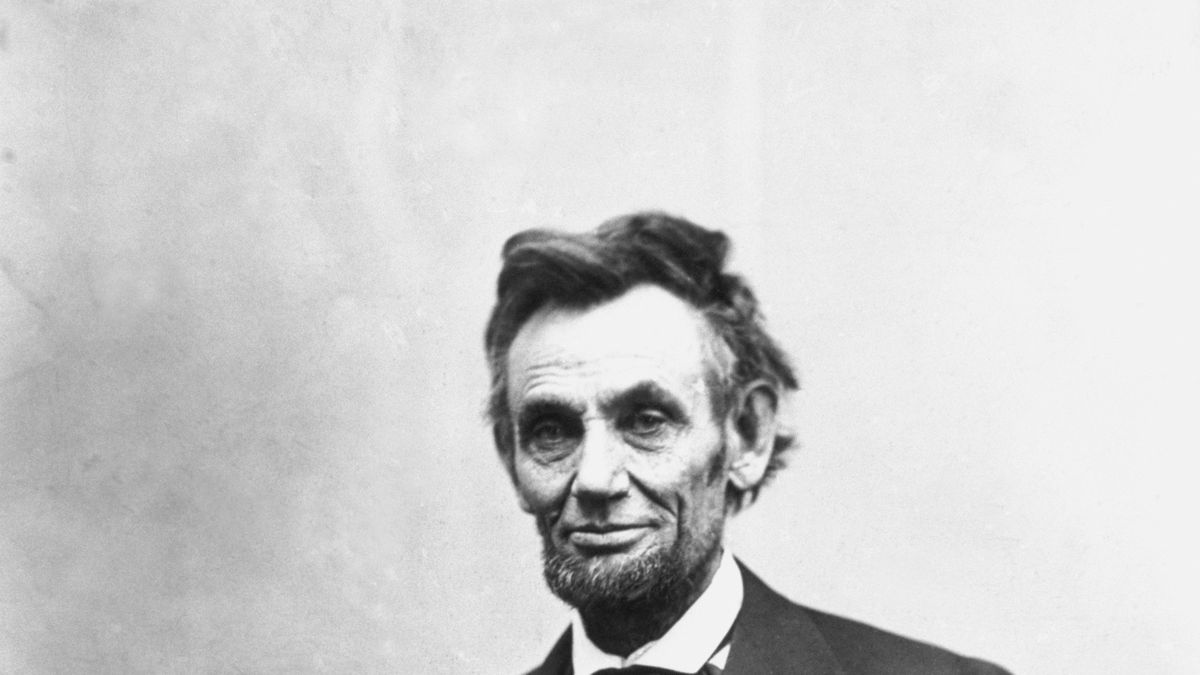

Quick Facts
Early life, parents, and education, how tall was abraham lincoln, wrestling hobby and legal career, wife and children, political career, lincoln and slavery, senate race, u.s. president, civil war begins, emancipation proclamation, gettysburg address, civil war ends and lincoln’s reelection, assassination and funeral, abraham lincoln’s hat, abraham lincoln in movies and tv, who was abraham lincoln.
Abraham Lincoln was the 16 th president of the United States , serving from 1861 to 1865, and is regarded as one of America’s greatest heroes due to his roles in guiding the Union through the Civil War and working to emancipate enslaved people. His eloquent support of democracy and insistence that the Union was worth saving embody the ideals of self-government that all nations strive to achieve. In 1863, he issued the Emancipation Proclamation, which freed slaves across the Confederacy. Lincoln’s rise from humble beginnings to achieving the highest office in the land is a remarkable story, and his death is equally notably. He was assassinated by John Wilkes Booth in 1865, at age 56, as the country was slowly beginning to reunify following the war. Lincoln’s distinctively humane personality and incredible impact on the nation have endowed him with an enduring legacy.
FULL NAME: Abraham Lincoln BORN: February 12, 1809 DIED: April 15, 1865 BIRTHPLACE: Hodgenville, Kentucky SPOUSE: Mary Todd Lincoln (m. 1842) CHILDREN: Robert Todd Lincoln , Edward Baker Lincoln, William Wallace Lincoln, and Thomas “Tad” Lincoln ASTROLOGICAL SIGN: Aquarius HEIGHT: 6 feet 4 inches
Abraham Lincoln was born on February 12, 1809, to parents Thomas Lincoln and Nancy Hanks Lincoln in rural Hodgenville, Kentucky.
Thomas was a strong and determined pioneer who found a moderate level of prosperity and was well respected in the community. The couple had two other children: Lincoln’s older sister, Sarah, and younger brother, Thomas, who died in infancy. His death wasn’t the only tragedy the family would endure.
In 1817, the Lincolns were forced to move from young Abraham’s Kentucky birthplace to Perry County, Indiana, due to a land dispute. In Indiana, the family “squatted” on public land to scrap out a living in a crude shelter, hunting game and farming a small plot. Lincoln’s father was eventually able to buy the land.
When Lincoln was 9 years old, his 34-year-old mother died of tremetol, more commonly known as milk sickness, on October 5, 1818. The event was devastating to the young boy, who grew more alienated from his father and quietly resented the hard work placed on him at an early age.
In December 1819, just over a year after his mother’s death, Lincoln’s father Thomas married Sarah Bush Johnston, a Kentucky widow with three children of her own. She was a strong and affectionate woman with whom Lincoln quickly bonded.
Although both his parents were most likely illiterate, Thomas’ new wife Sarah encouraged Lincoln to read. It was while growing into manhood that Lincoln received his formal education—an estimated total of 18 months—a few days or weeks at a time.
Reading material was in short supply in the Indiana wilderness. Neighbors recalled how Lincoln would walk for miles to borrow a book. He undoubtedly read the family Bible and probably other popular books at that time such as Robinson Crusoe, Pilgrim’s Progres s, and Aesop’s Fable s.
In March 1830, the family again migrated, this time to Macon County, Illinois. When his father moved the family again to Coles County, 22-year-old Lincoln struck out on his own, making a living in manual labor.
Lincoln was 6 feet 4 inches tall, rawboned and lanky yet muscular and physically strong. He spoke with a backwoods twang and walked with a long-striding gait. He was known for his skill in wielding an ax and early on made a living splitting wood for fire and rail fencing.
Young Lincoln eventually migrated to the small community of New Salem, Illinois, where over a period of years he worked as a shopkeeper, postmaster, and eventually general store owner. It was through working with the public that Lincoln acquired social skills and honed a storytelling talent that made him popular with the locals.
Not surprising given his imposing frame, Lincoln was an excellent wrestler and had only one recorded loss—to Hank Thompson in 1832—over a span of 12 years. A shopkeeper who employed Lincoln in New Salem, Illinois, reportedly arranged bouts for him as a way to promote the business. Lincoln notably beat a local champion named Jack Armstrong and became somewhat of a hero. (The National Wrestling Hall of Fame posthumously gave Lincoln its Outstanding American Award in 1992.)
When the Black Hawk War broke out in 1832 between the United States and Native Americans, the volunteers in the area elected Lincoln to be their captain. He saw no combat during this time, save for “a good many bloody struggles with the mosquitoes,” but was able to make several important political connections.
As he was starting his political career in the early 1830s, Lincoln decided to become a lawyer. He taught himself the law by reading William Blackstone’s Commentaries on the Laws of England . After being admitted to the bar in 1837, he moved to Springfield, Illinois, and began to practice in the John T. Stuart law firm.
In 1844, Lincoln partnered with William Herndon in the practice of law. Although the two had different jurisprudent styles, they developed a close professional and personal relationship.
Lincoln made a good living in his early years as a lawyer but found that Springfield alone didn’t offer enough work. So to supplement his income, he followed the court as it made its rounds on the circuit to the various county seats in Illinois.
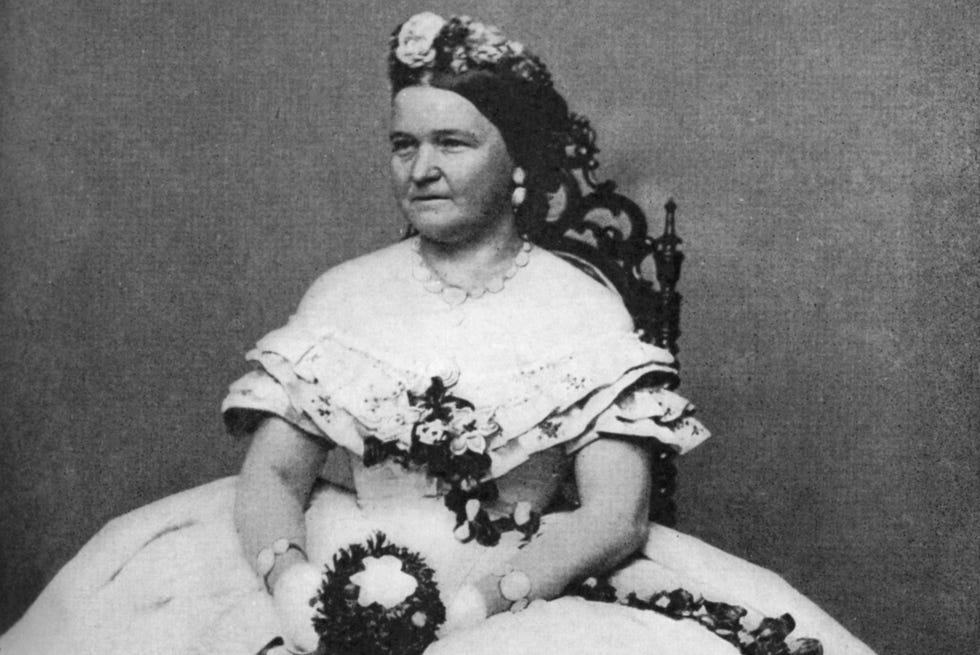
On November 4, 1842, Lincoln wed Mary Todd , a high-spirited, well-educated woman from a distinguished Kentucky family. Although they were married until Lincoln’s death, their relationship had a history of instability.
When the couple became engaged in 1840, many of their friends and family couldn’t understand Mary’s attraction; at times, Lincoln questioned it himself. In 1841, the engagement was suddenly broken off, most likely at Lincoln’s initiative. Mary and Lincoln met later at a social function and eventually did get married.
The couple had four sons— Robert Todd , Edward Baker, William Wallace, and Thomas “Tad”—of whom only Robert survived to adulthood.
Before marrying Todd, Lincoln was involved with other potential matches. Around 1837, he purportedly met and became romantically involved with Anne Rutledge. Before they had a chance to be engaged, a wave of typhoid fever came over New Salem, and Anne died at age 22.
Her death was said to have left Lincoln severely depressed. However, several historians disagree on the extent of Lincoln’s relationship with Rutledge, and his level of sorrow at her death might be more the makings of legend.
About a year after the death of Rutledge, Lincoln courted Mary Owens. The two saw each other for a few months, and marriage was considered. But in time, Lincoln called off the match.
In 1834, Lincoln began his political career and was elected to the Illinois state legislature as a member of the Whig Party . More than a decade later, from 1847 to 1849, he served a single term in the U.S. House of Representatives. His foray into national politics seemed to be as unremarkable as it was brief. He was the lone Whig from Illinois, showing party loyalty but finding few political allies.
As a congressman, Lincoln used his term in office to speak out against the Mexican-American War and supported Zachary Taylor for president in 1848. His criticism of the war made him unpopular back home, and he decided not to run for second term. Instead, he returned to Springfield to practice law.
By the 1850s, the railroad industry was moving west, and Illinois found itself becoming a major hub for various companies. Lincoln served as a lobbyist for the Illinois Central Railroad as its company attorney.
Success in several court cases brought other business clients as well, including banks, insurance companies, and manufacturing firms. Lincoln also worked in some criminal trials.
In one case, a witness claimed that he could identify Lincoln’s client who was accused of murder, because of the intense light from a full moon. Lincoln referred to an almanac and proved that the night in question had been too dark for the witness to see anything clearly. His client was acquitted.
As a member of the Illinois state legislature, Lincoln supported the Whig politics of government-sponsored infrastructure and protective tariffs. This political understanding led him to formulate his early views on slavery, not so much as a moral wrong, but as an impediment to economic development.
In 1854, Congress passed the Kansas-Nebraska Act , which repealed the Missouri Compromise , allowing individual states and territories to decide for themselves whether to allow slavery. The law provoked violent opposition in Kansas and Illinois, and it gave rise to today’s Republican Party .
This awakened Lincoln’s political zeal once again, and his views on slavery moved more toward moral indignation. Lincoln joined the Republican Party in 1856.
In 1857, the Supreme Court issued its controversial Dred Scott decision, declaring Black people were not citizens and had no inherent rights. Although Lincoln felt Black people weren’t equal to whites, he believed America’s founders intended that all men were created with certain inalienable rights.
Lincoln decided to challenge sitting U.S. Senator Stephen Douglas for his seat. In his nomination acceptance speech, he criticized Douglas, the Supreme Court , and President James Buchanan for promoting slavery then declared “a house divided cannot stand.”
During Lincoln’s 1858 U.S. Senate campaign against Douglas, he participated in seven debates held in different cities across Illinois. The two candidates didn’t disappoint, giving stirring debates on issues such as states’ rights and western expansion. But the central issue was slavery.
Newspapers intensely covered the debates, often times with partisan commentary. In the end, the state legislature elected Douglas, but the exposure vaulted Lincoln into national politics.
With his newly enhanced political profile, in 1860, political operatives in Illinois organized a campaign to support Lincoln for the presidency. On May 18, at the Republican National Convention in Chicago, Lincoln surpassed better-known candidates such as William Seward of New York and Salmon P. Chase of Ohio. Lincoln’s nomination was due, in part, to his moderate views on slavery, his support for improving the national infrastructure, and the protective tariff.
In the November 1860 general election, Lincoln faced his friend and rival Stephen Douglas, this time besting him in a four-way race that included John C. Breckinridge of the Northern Democrats and John Bell of the Constitution Party. Lincoln received not quite 40 percent of the popular vote but carried 180 of 303 Electoral College votes, thus winning the U.S. presidency. He grew his trademark beard after his election.
Lincoln’s Cabinet
Following his election to the presidency in 1860, Lincoln selected a strong cabinet composed of many of his political rivals, including William Seward, Salmon P. Chase, Edward Bates, and Edwin Stanton.
Formed out the adage “Hold your friends close and your enemies closer,” Lincoln’s cabinet became one of his strongest assets in his first term in office, and he would need them as the clouds of war gathered over the nation the following year.
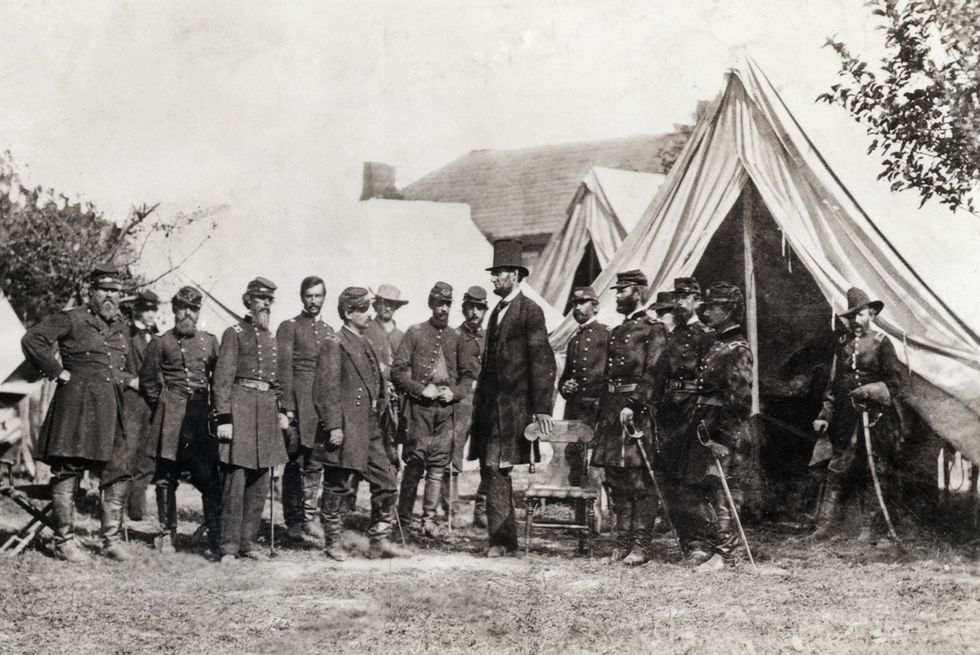
Before Lincoln’s inauguration in March 1861, seven Southern states had seceded from the Union, and by April, the U.S. military installation Fort Sumter was under siege in Charleston Harbor, South Carolina. In the early morning hours of April 12, 1861, the guns stationed to protect the harbor blazed toward the fort, signaling the start of the U.S. Civil War , America’s costliest and bloodiest war.
The newly President Lincoln responded to the crisis wielding powers as no other president before him: He distributed $2 million from the Treasury for war material without an appropriation from Congress; he called for 75,000 volunteers into military service without a declaration of war; and he suspended the writ of habeas corpus, allowing for the arrest and imprisonment of suspected Confederate States sympathizers without a warrant.
Crushing the rebellion would be difficult under any circumstances, but the Civil War, after decades of white-hot partisan politics, was especially onerous. From all directions, Lincoln faced disparagement and defiance. He was often at odds with his generals, his cabinet, his party, and a majority of the American people.
On January 1, 1863, Lincoln delivered his official Emancipation Proclamation , reshaping the cause of the Civil War from saving the Union to abolishing slavery.
The Union Army’s first year and a half of battlefield defeats made it difficult to keep morale high and support strong for a reunification of the nation. And the Union victory at Antietam on September 22, 1862, while by no means conclusive, was hopeful. It gave Lincoln the confidence to officially change the goals of the war. On that same day, he issued a preliminary proclamation that slaves in states rebelling against the Union would be free as of January 1.
The Emancipation Proclamation stated that all individuals who were held as enslaved people in rebellious states “henceforward shall be free.” The action was more symbolic than effective because the North didn’t control any states in rebellion, and the proclamation didn’t apply to border states, Tennessee, or some Louisiana parishes.
As a result, the Union army shared the Proclamation’s mandate only after it had taken control of Confederate territory. In the far reaches of western Texas, that day finally came on June 19, 1865—more than two and a half years after the Emancipation Proclamation took effect. For decades, many Black Americans have celebrated this anniversary, known as Juneteenth or Emancipation Day, and in 2021, President Joe Biden made Juneteenth a national holiday.
Still, the Emancipation Proclamation did have some immediate impact. It permitted Black Americans to serve in the Union Army for the first time, which contributed to the eventual Union victory. The historic declaration also paved the way for the passage of the 13 th Amendment that ended legal slavery in the United States.
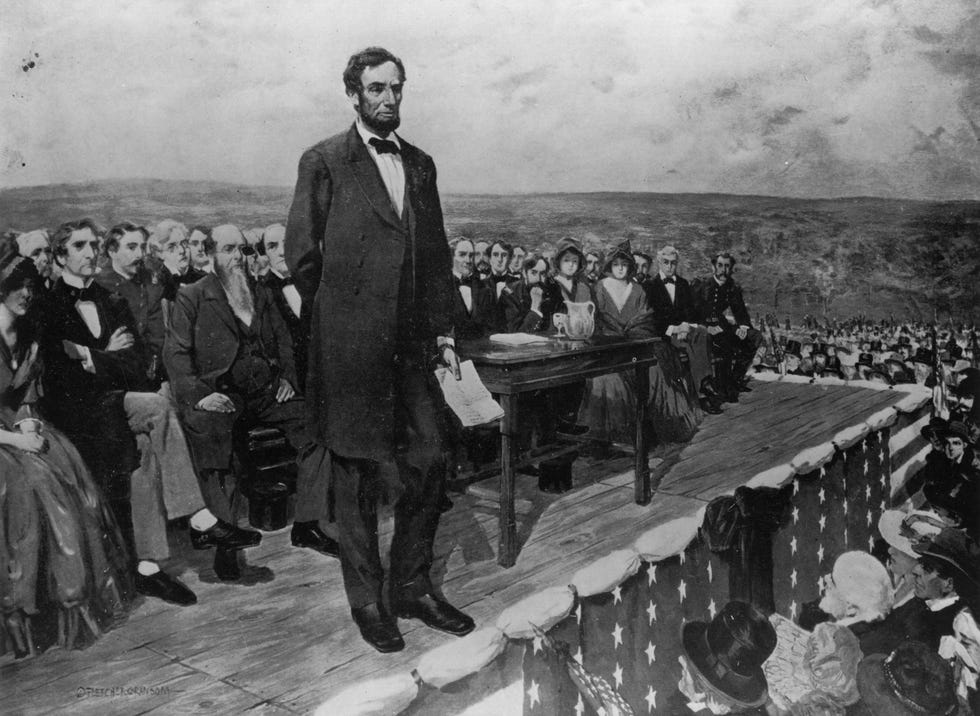
On November 19, 1863, Lincoln delivered what would become his most famous speech and one of the most important speeches in American history: the Gettysburg Address .
Addressing a crowd of around 15,000 people, Lincoln delivered his 272-word speech at one of the bloodiest battlefields of the Civil War, the Gettysburg National Cemetery in Pennsylvania. The Civil War, Lincoln said, was the ultimate test of the preservation of the Union created in 1776, and the people who died at Gettysburg fought to uphold this cause.
Lincoln evoked the Declaration of Independence , saying it was up to the living to ensure that the “government of the people, by the people, for the people, shall not perish from the earth,” and this Union was “dedicated to the proposition that all men are created equal.”
A common interpretation was that the president was expanding the cause of the Civil War from simply reunifying the Union to also fighting for equality and abolishing slavery.
Following Lincoln’s Emancipation Proclamation in 1863, the war effort gradually improved for the North, though more by attrition than by brilliant military victories.
But by 1864, the Confederate armies had eluded major defeat and Lincoln was convinced he’d be a one-term president. His nemesis George B. McClellan , the former commander of the Army of the Potomac, challenged him for the presidency, but the contest wasn’t even close. Lincoln received 55 percent of the popular vote and 212 of 243 electoral votes.
On April 9, 1865, General Robert E. Lee , commander of the Army of Virginia, surrendered his forces to Union General Ulysses S. Grant . The Civil War was for all intents and purposes over.
Reconstruction had already began during the Civil War, as early as 1863 in areas firmly under Union military control, and Lincoln favored a policy of quick reunification with a minimum of retribution. He was confronted by a radical group of Republicans in Congress that wanted complete allegiance and repentance from former Confederates. Before a political debate had any chance to firmly develop, Lincoln was killed.
Lincoln was assassinated on April 14, 1865, by well-known actor and Confederate sympathizer John Wilkes Booth at Ford’s Theatre in Washington. Lincoln was taken to the Petersen House across the street and laid in a coma for nine hours before dying the next morning. He was 56. His death was mourned by millions of citizens in the North and South alike.
Lincoln’s body first lay in state at the U. S. Capitol. About 600 invited guests attended a funeral in the East Room of the White House on April 19, though an inconsolable Mary Todd Lincoln wasn’t present.
His body was transported to his final resting place in Springfield, Illinois, by a funeral train. Newspapers publicized the schedule of the train, which made stops along various cities that played roles in Lincoln’s path to Washington. In 10 cities, the casket was removed and placed in public for memorial services. Lincoln was finally placed in a tomb on May 4.
On the day of Lincoln’s death, Andrew Johnson was sworn in as the 17 th president at the Kirkwood House hotel in Washington.
Lincoln, already taller than most, is known for his distinctive top hats. Although it’s unclear when he began wearing them, historians believe he likely chose the style as a gimmick.
He wore a top hat to Ford’s Theatre on the night of his assassination. Following his death, the War Department preserved the hat until 1867 when, with Mary Todd Lincoln’s approval, it was transferred to the Patent Office and the Smithsonian Institution. Worried about the commotion it might cause, the Smithsonian stored the hat in a basement instead of putting it on display. It was finally exhibited in 1893, and it’s now one of the Institution’s most treasured items.
Lincoln is frequently cited by historians and average citizens alike as America’s greatest president. An aggressively activist commander-in-chief, Lincoln used every power at his disposal to assure victory in the Civil War and end slavery in the United States.
Some scholars doubt that the Union would have been preserved had another person of lesser character been in the White House. According to historian Michael Burlingame , “No president in American history ever faced a greater crisis and no president ever accomplished as much.”
Lincoln’s philosophy was perhaps best summed up in his Second Inaugural Address , when he stated, “With malice toward none, with charity for all, with firmness in the right as God gives us to see the right, let us strive on to finish the work we are in, to bind up the nation’s wounds, to care for him who shall have borne the battle and for his widow and his orphan, to do all which may achieve and cherish a just and lasting peace among ourselves and with all nations.”
The Lincoln Memorial
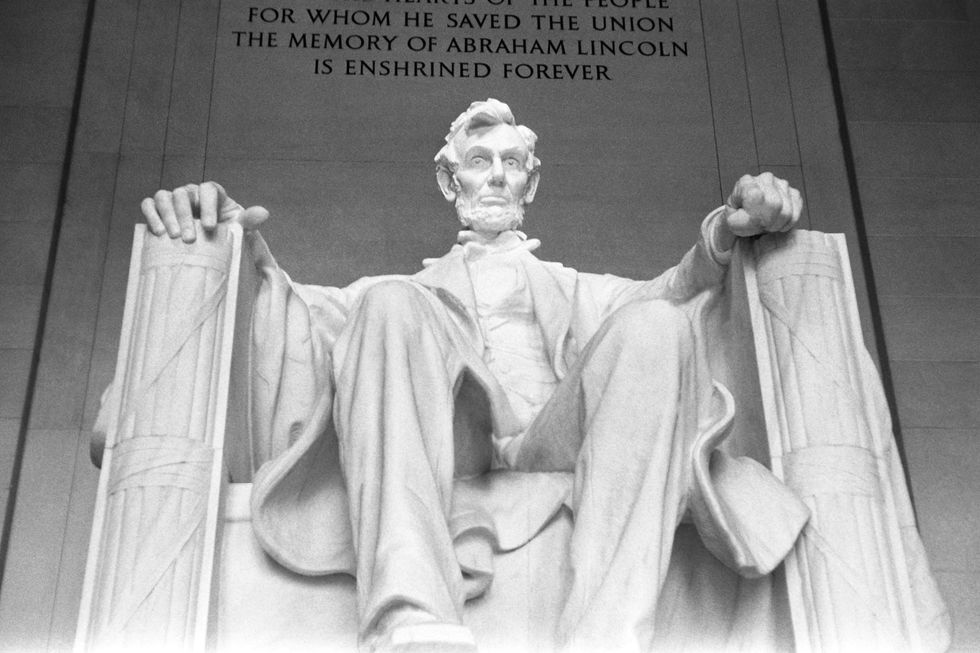
Since its dedication in 1922, the Lincoln Memorial in Washington has honored the president’s legacy. Inspired by the Greek Parthenon, the monument features a 19-foot high statue of Lincoln and engravings of the Gettysburg Address and Lincoln’s Second Inaugural Address. Former President William Howard Taft served as chair of the Lincoln Memorial Commission, which oversaw its design and construction.
The monument is the most visited in the city, attracting around 8 million people per year. Civil rights icon Martin Luther King Jr. delivered his famous “I Have a Dream” speech on the memorial’s steps in 1963.
Lincoln has been the subject of numerous films about his life and presidency, rooted in both realism and absurdity.
Among the earlier films featuring the former president is Young Mr. Lincoln (1939), which stars Henry Fonda and focuses on Lincoln’s early life and law career. A year later, Abe Lincoln in Illinois gave a dramatized account of Lincoln’s life after leaving Kentucky.
The most notable modern film is Lincoln , the 2012 biographical drama directed by Steven Spielberg and starring Daniel Day-Lewis as Lincoln and Sally Field as his wife, Mary Todd Lincoln . Day-Lewis won the Academy Award for Best Actor for his performance, and the film was nominated for Best Picture.
A more fantastical depiction of Lincoln came in the 1989 comedy film Bill and Ted’s Excellent Adventure , in which the titular characters played by Keanu Reeves and Alex Winter travel back in time for the president’s help in completing their high school history report. Lincoln gives the memorable instruction to “be excellent to each other and... party on, dudes!”
Another example is the 2012 action film Abraham Lincoln: Vampire Hunter , based on a 2010 novel by Seth Grahame-Smith. Benjamin Walker plays Lincoln, who leads a secret double life hunting the immortal creatures and even fighting them during the Civil War.
Lincoln’s role during the Civil War is heavily explored in the 1990 Ken Burns documentary The Civil War , which won two Emmy Awards and two Grammys. In 2022, the History Channel aired a three-part docuseries about his life simply titled Abraham Lincoln .
- Those who deny freedom to others deserve it not for themselves.
- I claim not to have controlled events, but confess plainly that events have controlled me.
- No man is good enough to govern another man, without that other ’ s consent.
- I have learned the value of old friends by making many new ones.
- Government of the people, by the people, for the people, shall not perish from the earth.
- Whenever I hear anyone arguing over slavery, I feel a strong impulse to see it tried on him personally.
- To give the victory to the right, not bloody bullets, but peaceful ballots only, are necessary.
- Our defense is in the preservation of the spirit which prizes liberty as the heritage of all men, in all lands, everywhere. Destroy this spirit, and you have planted the seeds of despotism around your own doors.
- Don ’ t interfere with anything in the Constitution. That must be maintained, for it is the only safeguard of our liberties.
- Always bear in mind that your own resolution to succeed is more important than any other one thing.
- With malice toward none; with charity for all; with firmness in the right, as God gives us to see the right, let us strive on to finish the work we are in; to bind up the nation ’ s wounds; to care for him who shall have borne the battle, and for his widow, and his orphan—to do all which may achieve and cherish a just and lasting peace, among ourselves, and with all nations.
- I walk slowly, but I never walk backward.
- Nearly all men can handle adversity, if you want to test a man’s character, give him power.
- I ’ m the big buck of this lick. If any of you want to try it, come on and whet your horns.
- We can complain because rose bushes have thorns.
- Am I not destroying my enemies when I make friends of them?
- It is better to remain silent and be thought a fool than to open one’s mouth and remove all doubt.
Fact Check: We strive for accuracy and fairness. If you see something that doesn’t look right, contact us !
The Biography.com staff is a team of people-obsessed and news-hungry editors with decades of collective experience. We have worked as daily newspaper reporters, major national magazine editors, and as editors-in-chief of regional media publications. Among our ranks are book authors and award-winning journalists. Our staff also works with freelance writers, researchers, and other contributors to produce the smart, compelling profiles and articles you see on our site. To meet the team, visit our About Us page: https://www.biography.com/about/a43602329/about-us
Tyler Piccotti first joined the Biography.com staff as an Associate News Editor in February 2023, and before that worked almost eight years as a newspaper reporter and copy editor. He is a graduate of Syracuse University. When he's not writing and researching his next story, you can find him at the nearest amusement park, catching the latest movie, or cheering on his favorite sports teams.
Civil War Figures
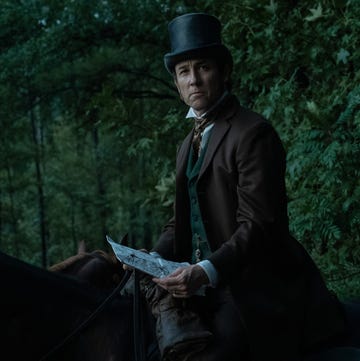
The 13 Most Cunning Military Leaders
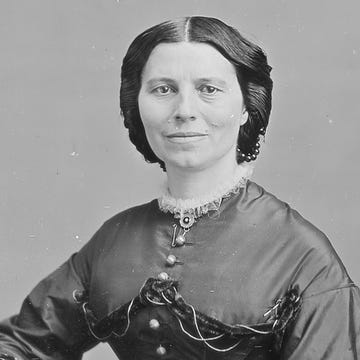
Clara Barton
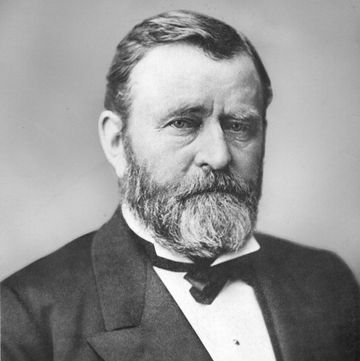
The Story of President Ulysses S. Grant’s Arrest
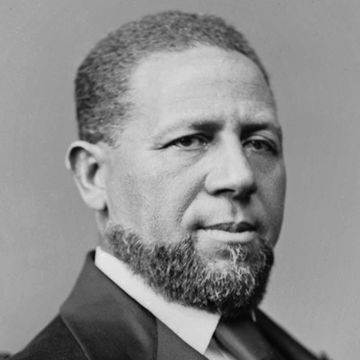
Hiram R. Revels
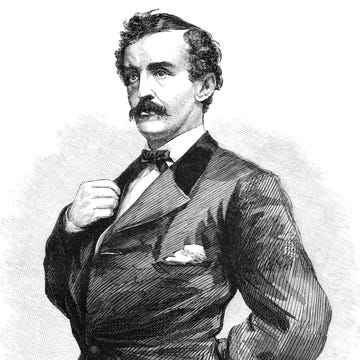
John Wilkes Booth
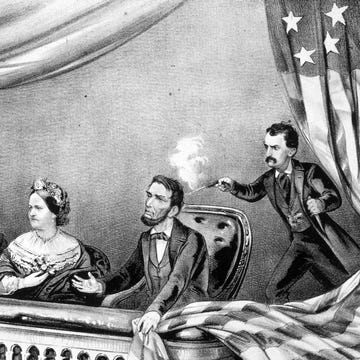
The Final Days of Abraham Lincoln
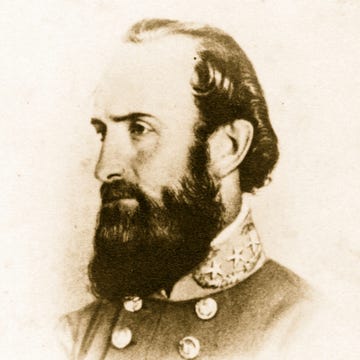
Stonewall Jackson
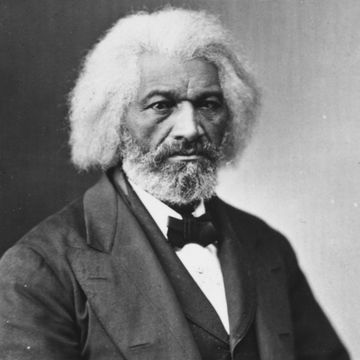
Frederick Douglass
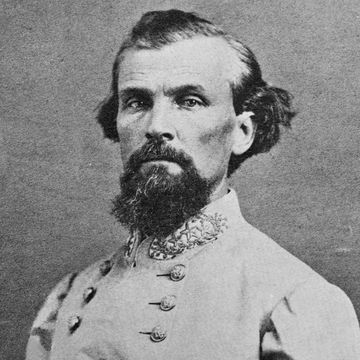
Nathan Bedford Forrest
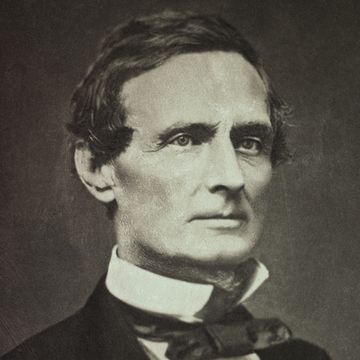
Jefferson Davis
- History Classics
- Your Profile
- Find History on Facebook (Opens in a new window)
- Find History on Twitter (Opens in a new window)
- Find History on YouTube (Opens in a new window)
- Find History on Instagram (Opens in a new window)
- Find History on TikTok (Opens in a new window)
- This Day In History
- History Podcasts
- History Vault
Abraham Lincoln
By: History.com Editors
Updated: February 7, 2024 | Original: October 29, 2009

Abraham Lincoln , a self-taught lawyer, legislator and vocal opponent of slavery, was elected 16th president of the United States in November 1860, shortly before the outbreak of the Civil War. Lincoln proved to be a shrewd military strategist and a savvy leader: His Emancipation Proclamation paved the way for slavery’s abolition, while his Gettysburg Address stands as one of the most famous pieces of oratory in American history.
In April 1865, with the Union on the brink of victory, Abraham Lincoln was assassinated by Confederate sympathizer John Wilkes Booth. Lincoln’s assassination made him a martyr to the cause of liberty, and he is widely regarded as one of the greatest presidents in U.S. history.
Abraham Lincoln's Childhood and Early Life
Lincoln was born on February 12, 1809, to Nancy and Thomas Lincoln in a one-room log cabin in Hardin County, Kentucky . His family moved to southern Indiana in 1816. Lincoln’s formal schooling was limited to three brief periods in local schools, as he had to work constantly to support his family.
In 1830, his family moved to Macon County in southern Illinois , and Lincoln got a job working on a river flatboat hauling freight down the Mississippi River to New Orleans . After settling in the town of New Salem, Illinois, where he worked as a shopkeeper and a postmaster, Lincoln became involved in local politics as a supporter of the Whig Party , winning election to the Illinois state legislature in 1834.
Like his Whig heroes Henry Clay and Daniel Webster , Lincoln opposed the spread of slavery to the territories, and had a grand vision of the expanding United States, with a focus on commerce and cities rather than agriculture.
Did you know? The war years were difficult for Abraham Lincoln and his family. After his young son Willie died of typhoid fever in 1862, the emotionally fragile Mary Lincoln, widely unpopular for her frivolity and spendthrift ways, held seances in the White House in the hopes of communicating with him, earning her even more derision.
Lincoln taught himself law, passing the bar examination in 1836. The following year, he moved to the newly named state capital of Springfield. For the next few years, he worked there as a lawyer and served clients ranging from individual residents of small towns to national railroad lines.
He met Mary Todd , a well-to-do Kentucky belle with many suitors (including Lincoln’s future political rival, Stephen Douglas ), and they married in 1842. The Lincolns went on to have four children together, though only one would live into adulthood: Robert Todd Lincoln (1843–1926), Edward Baker Lincoln (1846–1850), William Wallace Lincoln (1850–1862) and Thomas “Tad” Lincoln (1853-1871).
Abraham Lincoln Enters Politics
Lincoln won election to the U.S. House of Representatives in 1846 and began serving his term the following year. As a congressman, Lincoln was unpopular with many Illinois voters for his strong stance against the Mexican-American War. Promising not to seek reelection, he returned to Springfield in 1849.
Events conspired to push him back into national politics, however: Douglas, a leading Democrat in Congress, had pushed through the passage of the Kansas-Nebraska Act (1854), which declared that the voters of each territory, rather than the federal government, had the right to decide whether the territory should be slave or free.
On October 16, 1854, Lincoln went before a large crowd in Peoria to debate the merits of the Kansas-Nebraska Act with Douglas, denouncing slavery and its extension and calling the institution a violation of the most basic tenets of the Declaration of Independence .
With the Whig Party in ruins, Lincoln joined the new Republican Party–formed largely in opposition to slavery’s extension into the territories–in 1856 and ran for the Senate again that year (he had campaigned unsuccessfully for the seat in 1855 as well). In June, Lincoln delivered his now-famous “house divided” speech, in which he quoted from the Gospels to illustrate his belief that “this government cannot endure, permanently, half slave and half free.”
Lincoln then squared off against Douglas in a series of famous debates; though he lost the Senate election, Lincoln’s performance made his reputation nationally.
Abraham Lincoln’s 1860 Presidential Campaign
Lincoln’s profile rose even higher in early 1860 after he delivered another rousing speech at New York City’s Cooper Union. That May, Republicans chose Lincoln as their candidate for president, passing over Senator William H. Seward of New York and other powerful contenders in favor of the rangy Illinois lawyer with only one undistinguished congressional term under his belt.
In the general election, Lincoln again faced Douglas, who represented the northern Democrats; southern Democrats had nominated John C. Breckenridge of Kentucky, while John Bell ran for the brand new Constitutional Union Party. With Breckenridge and Bell splitting the vote in the South, Lincoln won most of the North and carried the Electoral College to win the White House .
He built an exceptionally strong cabinet composed of many of his political rivals, including Seward, Salmon P. Chase, Edward Bates and Edwin M. Stanton .
Abraham Lincoln and the Civil War
After years of sectional tensions, the election of an antislavery northerner as the 16th president of the United States drove many southerners over the brink. By the time Lincoln was inaugurated as 16th U.S. president in March 1861, seven southern states had seceded from the Union and formed the Confederate States of America .
Lincoln ordered a fleet of Union ships to supply the federal Fort Sumter in South Carolina in April. The Confederates fired on both the fort and the Union fleet, beginning the Civil War . Hopes for a quick Union victory were dashed by defeat in the Battle of Bull Run (Manassas) , and Lincoln called for 500,000 more troops as both sides prepared for a long conflict.
While the Confederate leader Jefferson Davis was a West Point graduate, Mexican War hero and former secretary of war, Lincoln had only a brief and undistinguished period of service in the Black Hawk War (1832) to his credit. He surprised many when he proved to be a capable wartime leader, learning quickly about strategy and tactics in the early years of the Civil War, and about choosing the ablest commanders.
General George McClellan , though beloved by his troops, continually frustrated Lincoln with his reluctance to advance, and when McClellan failed to pursue Robert E. Lee’s retreating Confederate Army in the aftermath of the Union victory at Antietam in September 1862, Lincoln removed him from command.
During the war, Lincoln drew criticism for suspending some civil liberties, including the right of habeas corpus , but he considered such measures necessary to win the war.
Emancipation Proclamation and Gettysburg Address
Shortly after the Battle of Antietam (Sharpsburg), Lincoln issued a preliminary Emancipation Proclamation , which took effect on January 1, 1863, and freed all of the enslaved people in the rebellious states not under federal control, but left those in the border states (loyal to the Union) in bondage.
Though Lincoln once maintained that his “paramount object in this struggle is to save the Union, and is not either to save or destroy slavery,” he nonetheless came to regard emancipation as one of his greatest achievements and would argue for the passage of a constitutional amendment outlawing slavery (eventually passed as the 13th Amendment after his death in 1865).
Two important Union victories in July 1863—at Vicksburg, Mississippi, and at the Battle of Gettysburg in Pennsylvania—finally turned the tide of the war. General George Meade missed the opportunity to deliver a final blow against Lee’s army at Gettysburg, and Lincoln would turn by early 1864 to the victor at Vicksburg, Ulysses S. Grant , as supreme commander of the Union forces.
In November 1863, Lincoln delivered a brief speech (just 272 words) at the dedication ceremony for the new national cemetery at Gettysburg. Published widely, the Gettysburg Address eloquently expressed the war’s purpose, harking back to the Founding Fathers, the Declaration of Independence and the pursuit of human equality. It became the most famous speech of Lincoln’s presidency, and one of the most widely quoted speeches in history.
Abraham Lincoln Wins 1864 Presidential Election
In 1864, Lincoln faced a tough reelection battle against the Democratic nominee, the former Union General George McClellan, but Union victories in battle (especially General William T. Sherman’s capture of Atlanta in September) swung many votes the president’s way. In his second inaugural address, delivered on March 4, 1865, Lincoln addressed the need to reconstruct the South and rebuild the Union: “With malice toward none; with charity for all.”
As Sherman marched triumphantly northward through the Carolinas after staging his March to the Sea from Atlanta, Lee surrendered to Grant at Appomattox Court House , Virginia , on April 9. Union victory was near, and Lincoln gave a speech on the White House lawn on April 11, urging his audience to welcome the southern states back into the fold. Tragically, Lincoln would not live to help carry out his vision of Reconstruction .
Abraham Lincoln’s Assassination
On the night of April 14, 1865, the actor and Confederate sympathizer John Wilkes Booth slipped into the president’s box at Ford’s Theatre in Washington, D.C., and shot him point-blank in the back of the head. Lincoln was carried to a boardinghouse across the street from the theater, but he never regained consciousness, and died in the early morning hours of April 15, 1865.
Lincoln’s assassination made him a national martyr. On April 21, 1865, a train carrying his coffin left Washington, D.C. on its way to Springfield, Illinois, where he would be buried on May 4. Abraham Lincoln’s funeral train traveled through 180 cities and seven states so mourners could pay homage to the fallen president.
Today, Lincoln’s birthday—alongside the birthday of George Washington —is honored on President’s Day , which falls on the third Monday of February.
Abraham Lincoln Quotes
“Nothing valuable can be lost by taking time.”
“I want it said of me by those who knew me best, that I always plucked a thistle and planted a flower where I thought a flower would grow.”
“I am rather inclined to silence, and whether that be wise or not, it is at least more unusual nowadays to find a man who can hold his tongue than to find one who cannot.”
“I am exceedingly anxious that this Union, the Constitution, and the liberties of the people shall be perpetuated in accordance with the original idea for which that struggle was made, and I shall be most happy indeed if I shall be a humble instrument in the hands of the Almighty, and of this, his almost chosen people, for perpetuating the object of that great struggle.”
“This is essentially a People's contest. On the side of the Union, it is a struggle for maintaining in the world, that form, and substance of government, whose leading object is, to elevate the condition of men—to lift artificial weights from all shoulders—to clear the paths of laudable pursuit for all—to afford all, an unfettered start, and a fair chance, in the race of life.”
“Fourscore and seven years ago our fathers brought forth on this continent a new nation, conceived in liberty and dedicated to the proposition that all men are created equal.”
“This nation, under God, shall have a new birth of freedom—and that government of the people, by the people, for the people, shall not perish from the earth.”

HISTORY Vault: Abraham Lincoln
A definitive biography of the 16th U.S. president, the man who led the country during its bloodiest war and greatest crisis.

Sign up for Inside History
Get HISTORY’s most fascinating stories delivered to your inbox three times a week.
By submitting your information, you agree to receive emails from HISTORY and A+E Networks. You can opt out at any time. You must be 16 years or older and a resident of the United States.
More details : Privacy Notice | Terms of Use | Contact Us
Abraham Lincoln
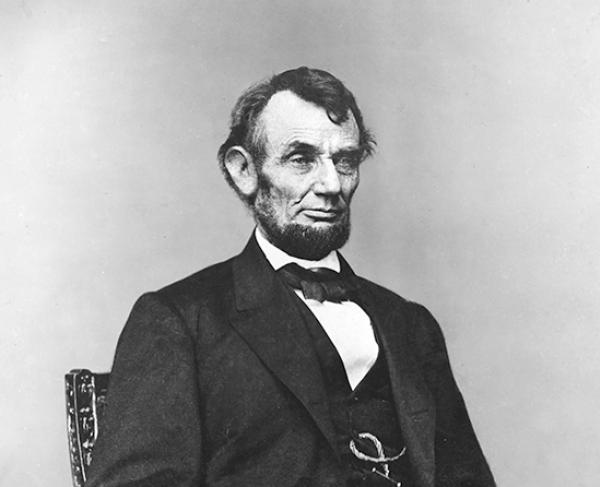
Abraham Lincoln, sixteenth President of the United States, was born near Hodgenville, Kentucky on February 12, 1809. His family moved to Indiana when he was seven and he grew up on the edge of the frontier. He had very little formal education, but read voraciously when not working on his father’s farm. A childhood friend later recalled Lincoln's "manic" intellect, and the sight of him red-eyed and tousle-haired as he pored over books late into the night. In 1828, at the age of nineteen, he accompanied a produce-laden flatboat down the Mississippi River to New Orleans, Louisiana—his first visit to a large city--and then walked back home. Two years later, trying to avoid health and finance troubles, Lincoln's father moved the family moved to Illinois.
After moving away from home, Lincoln co-owned a general store for several years before selling his stake and enlisting as a militia captain defending Illinois in the Black Hawk War of 1832. Black Hawk, a Sauk chief, believed he had been swindled by a recent land deal and sought to resettle his old holdings. Lincoln did not see direct combat during the short conflict, but the sight of corpse-strewn battlefields at Stillman's Run and Kellogg's Grove deeply affected him. As a captain, he developed a reputation for pragmatism and integrity. Once, faced with a rail fence during practice maneuvers and forgetting the parade-ground instructions to direct his men over it, he simply ordered them to fall out and reassemble on the other side a minute later. Another time, he stopped his men before they executed a wandering Native American as a spy. Stepping in front of their raised muskets, Lincoln is said to have challenged his men to combat for the terrified native's life. His men stood down.
After the war, he studied law and campaigned for a seat on the Illinois State Legislature. Although not elected in his first attempt, Lincoln persevered and won the position in 1834, serving as a Whig.
Abraham Lincoln met Mary Todd in Springfield, Illinois where he was practicing as a lawyer. They were married in 1842 over her family’s objections and had four sons. Only one lived to adulthood. The deep melancholy that pervaded the Lincoln family, with occasional detours into outright madness, is in some ways sourced in their close relationship with death.
Lincoln, a self-described "prairie lawyer," focused on his all-embracing law practice in the early 1850s after one term in Congress from 1847 to 1849. He joined the new Republican party—and the ongoing argument over sectionalism—in 1856. A series of heated debates in 1858 with Stephen A. Douglas , the sponsor of the 1854 Kansas-Nebraska Act , over slavery and its place in the United States forged Lincoln into a prominent figure in national politics. Lincoln’s anti-slavery platform made him extremely unpopular with Southerners and his nomination for President in 1860 enraged them.
On November 6, 1860, Lincoln won the presidential election without the support of a single Southern state. Talk of secession, bandied about since the 1830s, took on a serious new tone. The Civil War was not entirely caused by Lincoln’s election, but the election was one of the primary reasons the war broke out the following year.
Lincoln’s decision to fight rather than to let the Southern states secede was not based on his feelings towards slavery. Rather, he felt it was his sacred duty as President of the United States to preserve the Union at all costs. His first inaugural address was an appeal to the rebellious states, seven of which had already seceded, to rejoin the nation. His first draft of the speech ended with an ominous message: "Shall it be peace, or the sword?"
The Civil War began with the Confederate bombardment of Fort Sumter , South Carolina, on April 12, 1861. Fort Sumter, situated in the Charleston Harbour, was a Union outpost in the newly seceded Confederate territory. Lincoln, learning that the Fort was running low on food, sent supplies to reinforce the soldiers there. The Southern navy repulsed the supply convoy. After this repulse, the Southern navy fired the first shot of the war at Fort Sumter and the Federal defenders surrendered after a 34-hour long battle.
Throughout the war, Lincoln struggled to find capable generals for his armies. As commander-in-chief, he legally held the highest rank in the United States armed forces, and he diligently exercised his authority through strategic planning, weapons testing, and the promotion and demotion of officers. McDowell , Fremont, McClellan , Pope , McClellan again, Buell , Burnside , Rosecrans --all of these men and more withered under Lincoln's watchful eye as they failed to bring him success on the battlefield.
He did not issue his famous Emancipation Proclamation until January 1, 1863 after the Union victory at the Battle of Antietam . The Emancipation Proclamation, which was legally based on the President’s right to seize the property of those in rebellion against the State, only freed slaves in Southern states where Lincoln’s forces had no control. Nevertheless, it changed the tenor of the war, making it, from the Northern point of view, a fight both to preserve the Union and to end slavery.
In 1864, Lincoln ran again for President. After years of war, he feared he would not win. Only in the final months of the campaign did the exertions of Ulysses S. Grant , the quiet general now in command of all of the Union armies, begin to bear fruit. A string of heartening victories buoyed Lincoln's ticket and contributed significantly to his re-election. In his second inauguration speech , March 4, 1865, he set the tone he intended to take when the war finally ended. His one goal, he said, was “lasting peace among ourselves.” He called for “malice towards none” and “charity for all.” The war ended only a month later.
The Lincoln administration did more than just manage the Civil War, although its reverberations could still be felt in a number of policies. The Revenue Act of 1862 established the United States' first income tax, largely to pay the costs of total war. The Morrill Act of 1862 established the basis of the state university system in this country, while the Homestead Act, also passed in 1862, encouraged settlement of the West by offering 160 acres of free land to settlers. Lincoln also created the Department of Agriculture and formally instituted the Thanksgiving holiday. Internationally, he navigated the "Trent Affair," a diplomatic crisis regarding the seizure of a British ship carrying Confederate envoys, in such a way as to quell the saber-rattling overtures coming from Britain as well as the United States. In another spill-over from the war, Lincoln restricted the civil liberties of due process and freedom of the press.
On April 14, 1865, while attending a play at Ford’s Theatre in Washington, D.C., Abraham Lincoln was shot by Confederate sympathizer, John Wilkes Booth. The assassination was part of a larger plot to eliminate the Northern government that also left Secretary of State William Seward grievously injured. Lincoln died the following day, and with him the hope of reconstructing the nation without bitterness.
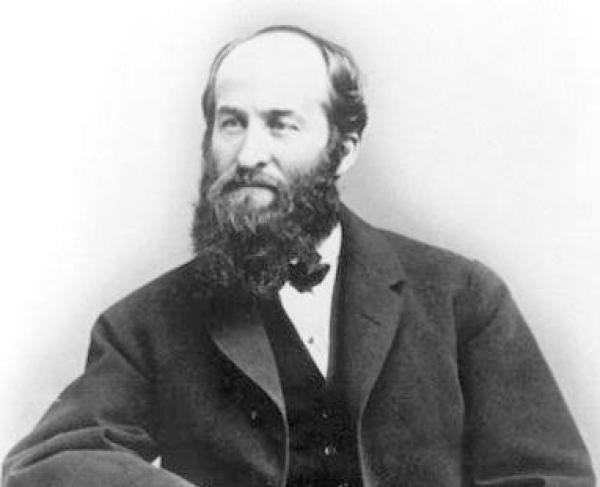
Noah Brooks
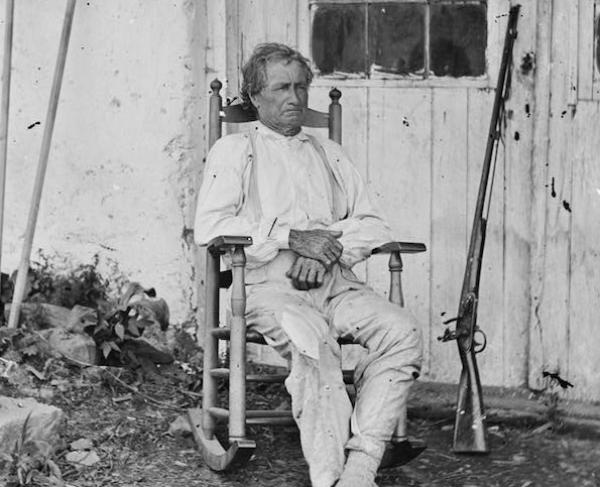
John L. Burns
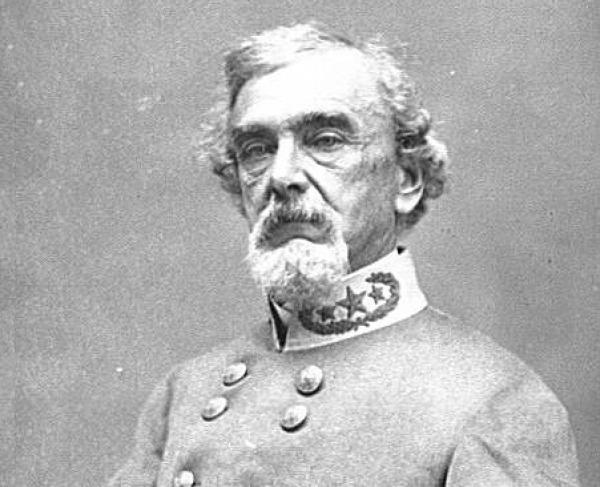
Benjamin Huger
You may also like.

The most comprehensive and authoritative history site on the Internet.
Abraham Lincoln: Facts, Information, Quotes, and Stories of the 16th U.S. President
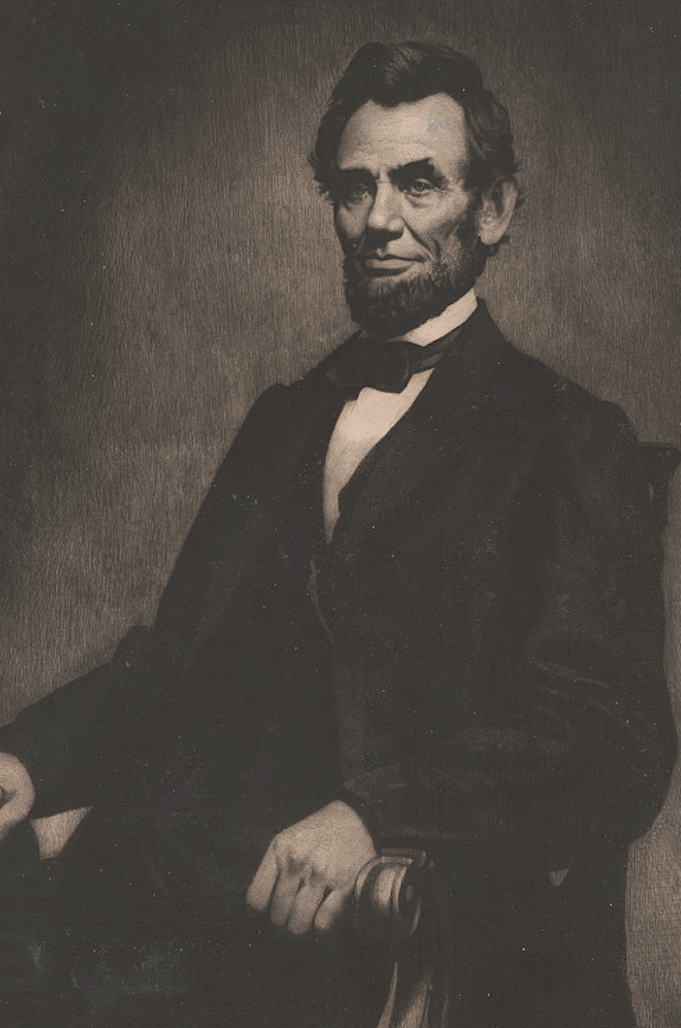
Abraham Lincoln was the 16th president of the United States of America, who successfully oversaw the Civil War to preserve the nation. He played a key role in passage of the Thirteenth Amendment, which officially ended slavery in America. Murdered by John Wilkes Booth , Lincoln became the first U.S. president to be assassinated. Prior to his election as president in 1860, he had successful careers as a lawyer and politician in Illinois, serving several terms in the state legislature and one in the U.S. House of Representatives.
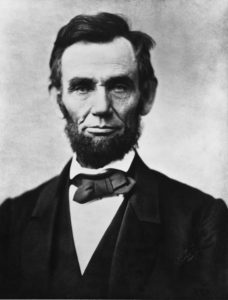
Lincoln also holds the distinction of being the only U.S. president to receive a patent; in 1849, he designed a system for lifting riverboats off sandbars.
February 12, 1809, in Hodgenville, Kentucky
April 15, 1865, at Petersen House, Washington, D.C.
Presidential Term
March 4, 1861–April 15, 1865
Mary Todd Lincoln
Major Accomplishments
- 16th President of the United States
- Led the United States through the Civil War
- Issued the Emancipation Proclamation
- Wrote the Gettysburg Address
More STories About Abraham Lincoln

How Abraham Lincoln’s Magician Became a Civil War Spy
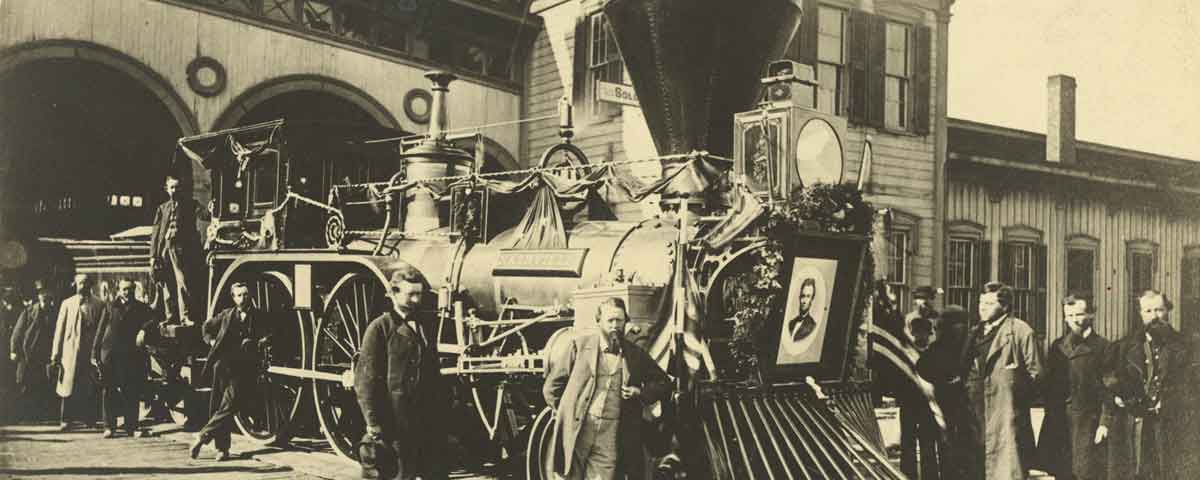
1,700 Miles of Mourners: Abraham Lincoln’s funeral train traveled across seven states
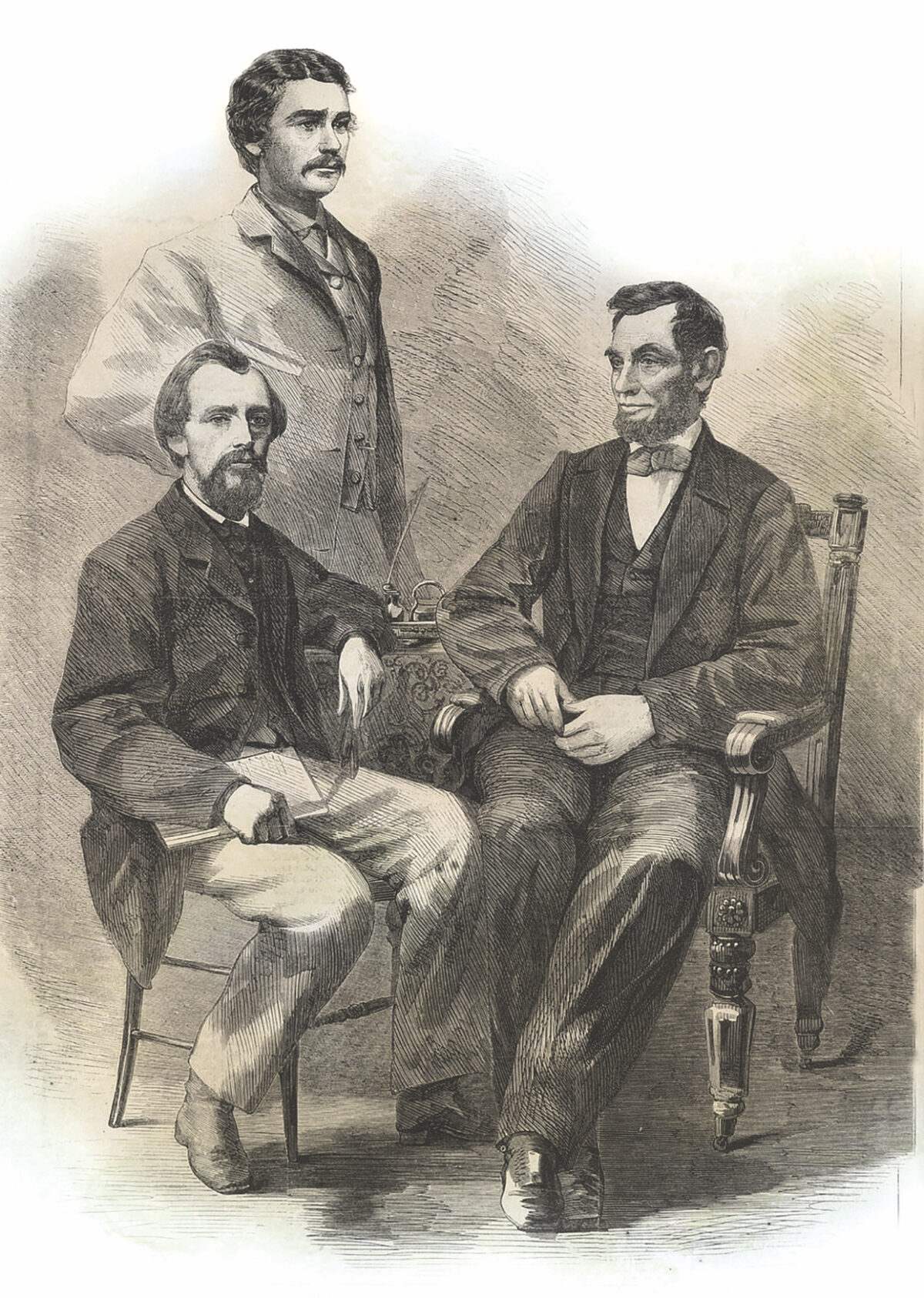
Marketing Abraham Lincoln to the Masses
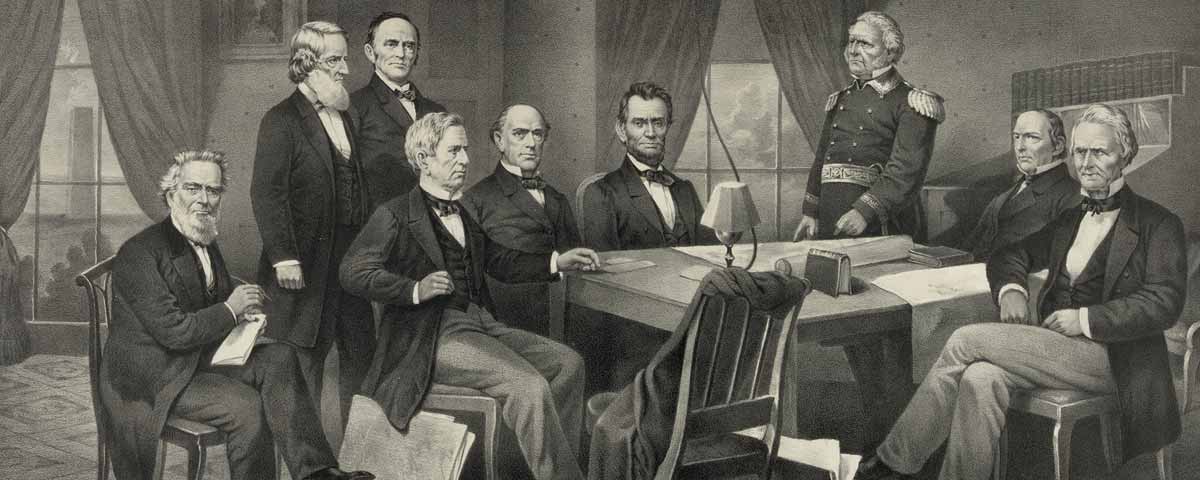
Why Abraham Lincoln Decided War With the South Was His Only Choice
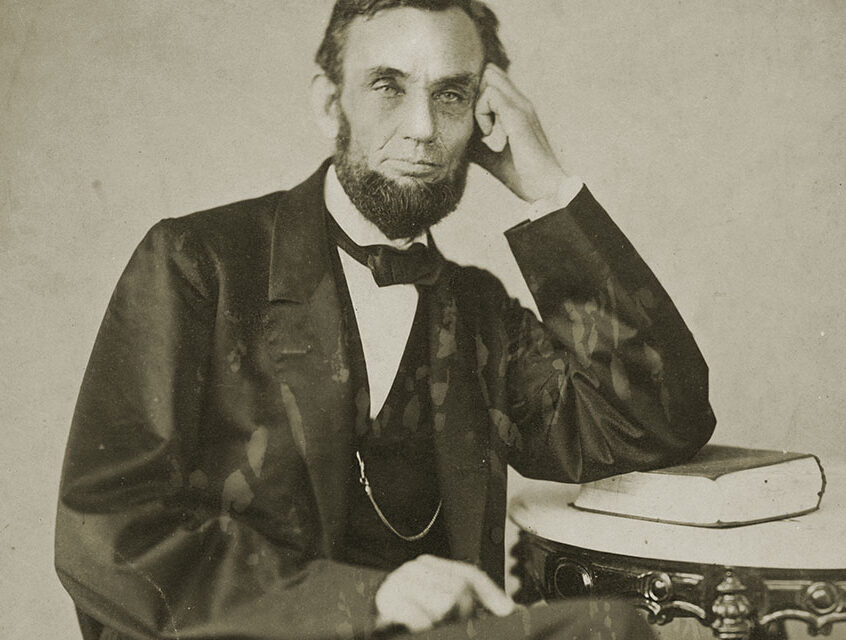
Count Him Out: When Lincoln Jumped Out of a Second-Story Window to Dodge a Quorum

The Private Lincoln: Examining His Most Personal Reflections
Quotes from abraham lincoln.
Four score and seven years ago our fathers brought forth on this continent, a new nation, conceived in Liberty, and dedicated to the proposition that all men are created equal. The Gettysburg Address, November 19, 1863
“A house divided against itself cannot stand.” I believe this government cannot endure, permanently half slave and half free. I do not expect the Union to be dissolved — I do not expect the house to fall — but I do expect it will cease to be divided. It will become all one thing or all the other. June 16, 1858, Springfield, Illinois
Abraham Lincoln’s Youth
Abraham Lincoln was born on Sinking Springs Farm near Hodgenville, Kentucky, on February 12, 1809, to Thomas and Nancy Hanks Lincoln. He was named for his paternal grandfather. His birthplace is believed to have been a 16-foot by 18-foot log cabin, which no longer exists. Lincoln had a sister, Sarah, who was two years and two days older than he was, and a younger brother, Thomas, who died in infancy.
When Abraham was two, the family moved to nearby Knob Creek Farm. Five years later, the family moved again, to the wilderness on Little Pigeon Creek in Indiana. On October 5, 1818, his mother died, reportedly of “milk sickness,” caused by drinking milk from cows that have eaten a poisonous, blossoming plant called snakeroot. Thomas Lincoln remarried a year later, to Sarah Bush Johnston, a woman of Elizabethtown, Kentucky, whom he had known for many years. She had three children by a previous marriage, Elizabeth, Matilda, and John. Although Abraham and his father were never close, Sarah and nine-year-old Abraham formed a loving relationship that continued throughout their lives. She encouraged him in his attempts to educate himself, which he did by borrowing and studying books.
Lincoln Moves To Illinois
In 1830, when Abraham was 21, the family moved to Illinois. He performed odd jobs and took a flatboat of goods to New Orleans. At New Salem, he was a partner in a store at that failed and would be many years paying off the last of the store’s creditors, an obligation he referred to as “the National Debt.” Elected captain of a militia unit during the 1832 Black Hawk War —an election he later would say pleased him more than any other—he saw no combat, but he met the man who would change his life in many ways: John Todd Stuart.
Lincoln Becomes A Lawyer
Stuart and Lincoln both ran for the Illinois General Assembly that year; Stuart won, Lincoln didn’t. Two years later, however, both men won election. The more experienced Stuart, known as “Jerry Sly” for his skills at management and intrigue, showed Lincoln the ropes and loaned him law books, that he might study to become an attorney. In 1836, Lincoln received a license to practice law. He would go on to establish a respectable record as an attorney and was often hired by the Illinois Central Railroad.
Lincoln won reelection to the General Assembly in 1836, 1838, and 1840; among his accomplishments was a major role in getting the state capital moved to Springfield. He did not actively seek the post again after 1840, but won the popular vote in 1854; however, he resigned so he would be eligible for election to the U.S. Senate.
Lincoln Goes To Congress
In 1846, he was elected to the U.S. House of Representatives, where he gave the infamous “Spot” speech about the war that had begun with Mexico. He demanded President James K. Polk reveal the exact spot on which American blood had been shed, starting the war, and whether that spot was on American or Mexican soil.
The speech may have been a reflection of words his “beau ideal” statesman, Speaker of the House Henry Clay, had uttered in a speech Lincoln heard while visiting Lexington, Kentucky, on the way to Washington. Or it may have been a partisan maneuver—Lincoln was a Whig, Polk a Democrat—to ingratiate himself with the older Whigs in Washington. Popular opinion in most of the country supported the war, and newspapers around the country ridiculed him as “Spotty Lincoln.” He did not run for reelection to Congress in 1848, but for the first time in its history, his home district elected a Democrat instead of a Whig. He spent the next several years focusing on his law practice to support his growing family.
In the Illinois legislature, he’d served with Ninian Wirt Edwards of Springfield, the son of a former governor of Illinois. Edwards’ wife was the former Elizabeth Todd of Lexington, Kentucky. When her younger sister, Mary, came from Lexington Lincoln became smitten; as Ninian observed, “Mary could make a bishop forget his prayers.” Although facts are unclear, an understanding apparently developed between Lincoln and Mary, but they parted ways in December of 1840 or January of 1841. Over a year later, a friend brought them back together, and they wed November 4, 1842.
There have long been stories—begun by Lincoln’s long-time law partner, William Herndon—that Lincoln had previously been engaged to Ann Rutledge in New Salem and had nearly lost his mind when she died. However, she was betrothed to another and there is no verifiable evidence of any romantic relationship or understanding between her and Lincoln. Neighbors’ stories indicate Lincoln did take her death hard. He was always prone to fits of “melancholia”—depression—and one state legislator claimed Lincoln told him he wouldn’t carry a pocket knife for fear he’d use it to harm himself.
Family Life With Mary Todd Lincoln
Abraham and Mary Lincoln would produce four children: Robert Todd, named for Mary’s father; Edward (Eddie) Baker, named for a close friend; William (Willie) Wallace, named for Dr. William Wallace, who had married Francis, another Todd sister, and had become close friends with Lincoln; and Thomas (Tad), named for Lincoln’s father who had died two years earlier. Eddie died in 1850, Willie in 1862, and Tad in 1871. Only Robert lived to adulthood; the last of his descendants would die in 1985, ending the Abraham Lincoln family line. (Learn more about Mary Todd Lincoln )
Although Lincoln did not seek office himself during these years, he remained active in the Whig Party, counseling candidates who sought his advice and occasionally responding to speaking requests. In 1854, he essentially was campaign manager for Richard Yates, who was running for the General Assembly. Lincoln did not want to be elected to that body again himself because he knew the legislature would be electing a new U.S. Senator during its coming term, to fill the position of James Shields, who had moved to the Minnesota Territory. (At that time, nearly 60 years before the Seventeenth Amendment to the U.S. Constitution provided for direct election of senators by the voters, they were chosen by each state’s legislature.) By Illinois law, sitting state legislators could not be elected to the U.S. Congress—and Lincoln desperately wanted to become the new senator, a position he said he would prefer over being president. Regardless, eventually he reluctantly agreed to run . He won more votes than any other candidate but resigned in order to keep his senatorial chances open.
His hopes were dashed again when the vote for senator was taken in 1857. Despite a strong start, he saw that a Democrat would be elected unless the Whigs united, so he threw his supporters’ votes to another candidate.
Since the early 1830s, abolitionists—those who adamantly favored abolishing slavery everywhere in the United States—had become increasingly strident. Even many people like Lincoln who did not approve of slavery also did not approve of the sectional divisiveness engendered by the abolitionists. Slaveholding states—virtually all of which were in the South—in responding to abolitionists’ attacks defended the “peculiar institution” of slavery more vociferously, and sectional tensions grew.
A Nation Dividing
In 1854, a passage of the Kansas-Nebraska Act allowed residents of any new states admitted to the Union to decide for themselves whether or not the state would be free or slaveholding. In the 1857 Dred Scott decision the Supreme Court ruled that neither the Declaration of Independence nor the rights guaranteed by the Constitution applied to Negroes and never had. As a result of these events, many who had disassociated themselves with abolitionists’ agitation began drifting into their camp, and the abolitionists movement intensified.
Like his father, Lincoln opposed slavery; however, he also deplored abolitionists’ activities because they threatened to cause a schism in the nation. In regard to “slavery agitation” he said, “In my opinion, it will not cease, until a crisis shall have been reached, and passed. ‘A house divided against itself cannot stand'”
Notes for a speech he delivered in Ohio clearly articulate his opinions on the slavery issue in the 1850s:
“We must not disturb slavery in the states where it exists, because the Constitution, and the peace of the country both forbid us – We must not withhold an efficient fugitive slave law, for the constitution demands it – But we must, by a national policy, prevent the spread of slavery into new territories, or free states, because the constitution does not forbid us, and the general welfare does demand such prevention.” (Abraham Lincoln, (September 16–17, 1859), Notes for Speech in Kansas and Ohio)
The Whig Party to which he had always been dedicated was dying. By 1854, a new party, the Republicans, was taking its place. Comprised of old Whigs, disaffected Democrats and members of the Native American Party (“Know-Nothings”), its unifying theme was opposition to the institution of slavery. In 1856, Lincoln joined the new party.
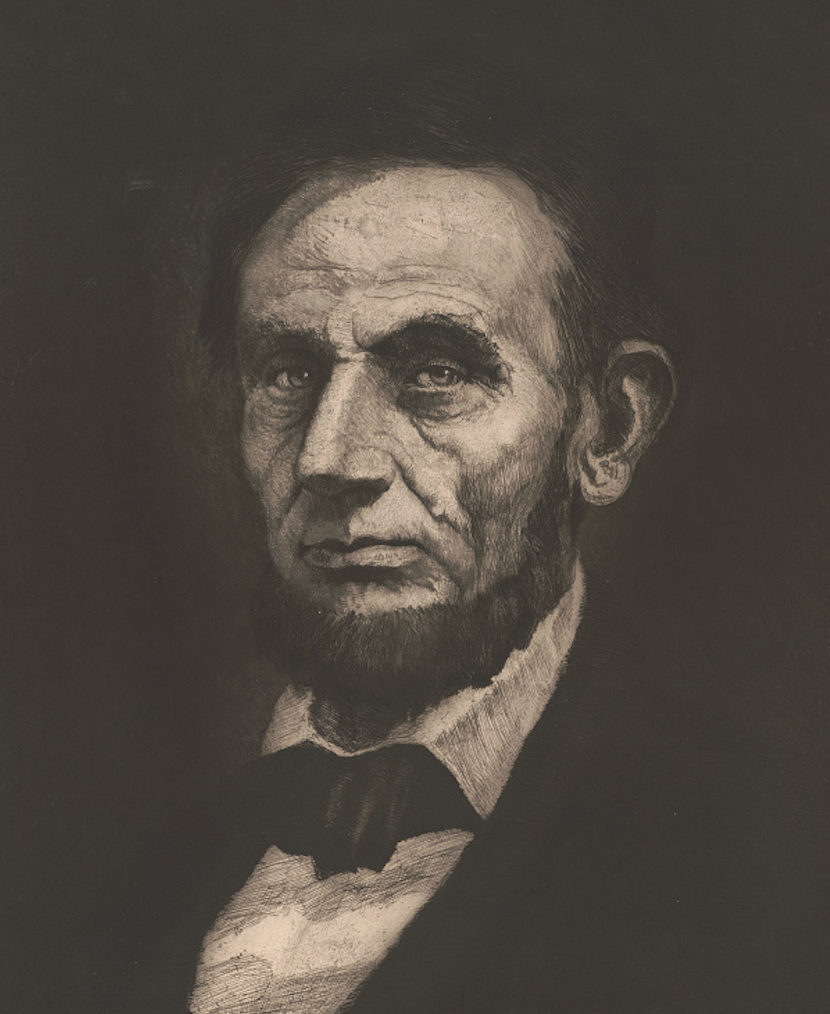
The Lincoln Douglas Debates
In 1858, he engaged in a legendary series of debates across Illinois with the author of the Kansas-Nebraska Act, Sen. Stephen Douglas. The five-foot, four-inch Douglas—”the Little Giant”—and the lanky, six-foot-four Lincoln faced off over the issue of expanding slavery beyond the states where it currently existed. Lincoln carefully made a distinction between slavery where it existed and its expansion into new territories and states. The debates drew national attention , and Lincoln was invited to speak in other states.
The national attention he received resulted in the Republican Party making him its presidential candidate in the 1860 election. On the divisive matter of slavery, the Republican platform supported prohibiting slavery in the territories but opposed interfering with it in the states where it already existed.
The Democratic Party split, producing two candidates, Stephen A. Douglas of Illinois and John C. Breckinridge of Kentucky. An independent Constitutional Union Party ran John Bell of Tennessee as its candidate. Two other independent parties formed but failed to carry a single state in the fall elections. Breckinridge carried the Deep South and two slave-holding East Coast states, Maryland and Delaware; Bell won Kentucky, Tennessee and Virginia; Douglas only carried Missouri. Lincoln won every Northern state, California and Oregon; although he failed to win a majority of the popular vote in this drawn-and-quartered election, he won enough electoral votes—180 compared to 123 for all his opponents combined—to become the 16th president.
President Abraham Lincoln
On December 20, nearly three months before Lincoln would take office (presidential inaugurations occurred in March at that time), South Carolina officially seceded from the Union. It was soon joined by all states of the Deep South. They feared the rise of this new, sectional party that opposed expansion of slavery. If the peculiar institution was not allowed to spread, slaveholding states would be outnumbered, and they feared losing the political power that protected slavery.
For weeks, president-elect Lincoln said nothing as state after state renounced its compact with the United States, though it is questionable whether anything he said would have halted the secession movement. Previous presidents under whom secession was threatened—Andrew Jackson and Zachary Taylor—had both said they would send troops to force states to remain in the Union but never had to take that action. Lincoln, faced with the reality of losing a section of the country, felt he did have to after Confederate guns fired during the Battle of Fort Sumter , South Carolina, on April 12, 1861.
The Civil War Begins
He called for 75,000 troops to suppress the Southern rebellion. Virginia, Arkansas and Tennessee then seceded, refusing to fight their fellow Southerners and claiming Lincoln had overreached his authority because Congress was not in session and therefore could not authorize a war.
The new president knew little of military affairs, but just as he had educated himself as a youth, he began a self-education in the art of war, checking books of military history out of the Library of Congress. From this reading, and perhaps from an innate sense of what needed to be done, he at times seemed to understand better than some of his generals that destroying the enemy’s armies was more important than capturing the Confederate capital.
He endured outright insubordination from one commander, Major General George B. McClellan, in charge of the largest Union army. Lincoln said he’d hold McClellan’s horse if it would help to win the war, but once he determined “Little Mac” was too cautious to win much of anything, he removed him. Not until March of 1864, when he placed Lieutenant General Ulysses S. Grant in charge of all Union armies, did Lincoln find a general in whom he had trust. Grant had previously won major victories at the Siege of Fort Donelson , Battle of Vicksburg , and Battle of Chattanooga .
Lincoln, in choosing his cabinet, had selected those men he felt most capable of handling the duties of the posts he asked them to fill. Some of them had hoped during the last election that they would be filling the chair of the presidency. Historian Doris Kearns Goodwin called the Lincoln Cabinet “A Team of Rivals.” His willingness to work with men, some of whom he knew had a low opinion of him—at least initially—says much about Lincoln’s character and his determination to do whatever it took to preserve the Union.
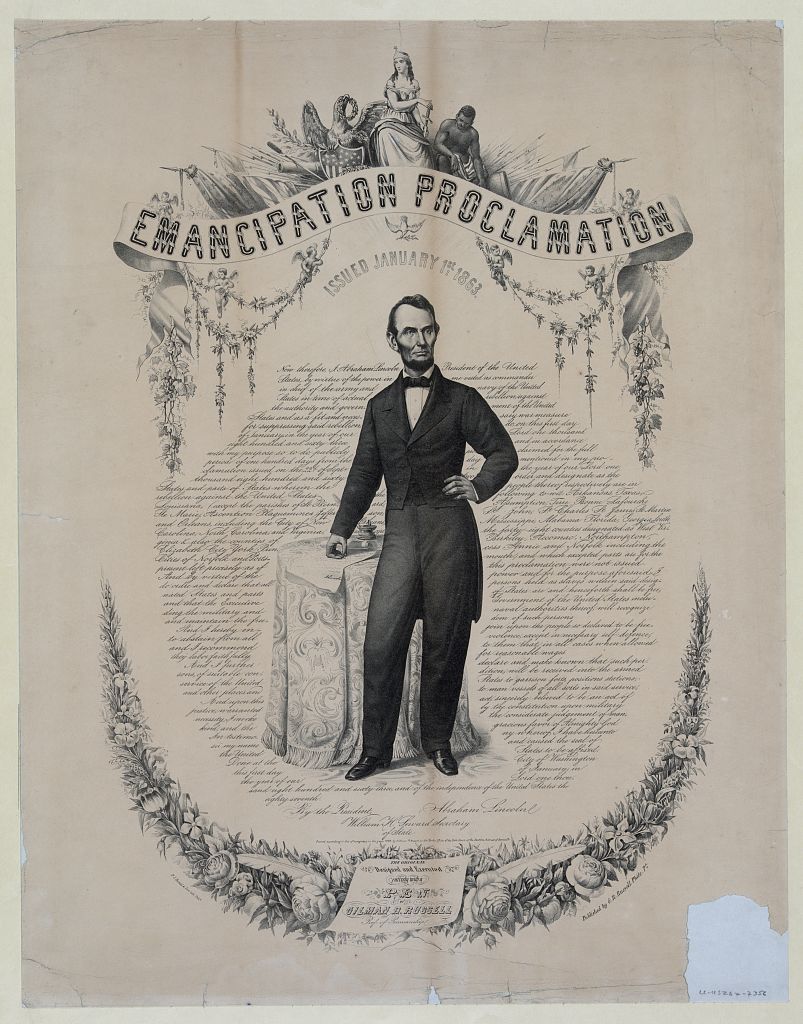
The Emancipation Proclamation
Following the Battle of Antietam, on January 1, 1963, Abraham Lincoln announced his Emancipation Proclamation . It granted freedom to slaves—but only to those in the areas still in rebellion, which didn’t recognize his authority. It was a war measure, meant to prevent European recognition of the slaveholding Confederacy, and it shifted the war from one to preserve the Union to one that would both preserve the Union and end slavery.
Other controversial war measures taken by Lincoln and his administration included infringing on some Constitutional rights, including suspending habeas corpus and shutting down newspapers that opposed the war. He signed the bill admitting West Virginia as a state of the Union, although it had been formed from Virginia without the permission of the state’s government at Richmond, which many, including half of his cabinet members, believed was a violation of Article IV, Section 3 of the Constitution. Nevada was admitted at least in part to provide another pro-Union state.
Lincoln Reelected In 1864
In presidential elections of 1864, Lincoln believed he would not be reelected. The war had dragged on for over three years, draining the treasury. Major battles, like the Battle of Shiloh , the Battle of Antietam , the Battle of Fredericksburg , the Battle of Chancellorsville , the Battle Gettysburg , and the Battle of Chickamauga , had each produced over 10,000 casualties, far beyond anything the nation had experienced in previous wars. Grant’s current campaign in Virginia had already suffered nearly 50,000 losses. Radical abolitionists in the North were upset with him for not pressing harder on the slavery issue.
The Democratic Party, banking on war weariness, was running George McClellan, the former general, as their candidate, under the slogan, “The Union as it was, and the Constitution as it is,” and pledging a truce with the Confederacy. Indeed, Lincoln might have lost his bid for re-election, and with it the war, had Maj. Gen. William T. Sherman not captured Atlanta in early September, giving the Union a major victory. Other contributing factors included Lincoln allowing soldiers in the armies to vote in their camps, something that had never been done before. The Democrats themselves made several missteps that hurt their chances. Lincoln won reelection and in his second inaugural address called for, “malice toward none, with charity for all,” attempting to set the stage for a reconciliation with the South.
He had personally experienced the “divided house” he’d once warned of. All but one of his wife’s half-siblings fought for the Confederacy or married men who did, and one of her full brothers became a Confederate surgeon. Only three of her sisters in Illinois and their husbands remained firmly with the Union.
The End Of The Civil War
On April 9, 1865, General Robert E. Lee surrendered the largest Confederate army to Grant following the Appomattox Campaign and the Appomattox Courthouse , virtually ending the war. Lincoln, asked what should be done with the citizens of the Confederate capital at Richmond, Virginia, responded, “I’d let ’em up easy, let ’em up easy.”
Abraham Lincoln Assassinated
With the light of victory clearly breaking over the horizon, Lincoln and Mary went to Ford’s Theater on the night of April 14 to see the comedy, “Our American Cousin.” During the performance, an actor and staunch Confederate sympathizer named John Wilkes Booth slipped into the presidential box and shot Lincoln in the head. The president died the following morning. Within 24 hours, not a shred of black crepe was to be had in the nation’s capitol as homes, stores and government buildings were draped in mourning. Even some Southern newspapers condemned the assassination.
Lincoln was laid to rest in Springfield, Illinois. In 1876, a counterfeiting gang attempted to steal his body, to exchange it for their master engraver, who had been imprisoned. The plan was thwarted, and when the president’s body was placed in a new tomb in 1901, some 4,000 pounds of cement were poured on top of his coffin to prevent any future attempts.
The popular image of Lincoln has changed many times. He is beloved as the Great Emancipator and the Savior of the Union, but many people, particularly in the South, regard him as a tyrant and a dictator. He has been accused of being racist, though his views were in keeping with those of most Americans of his times. During his presidency, association with black leaders such as Frederick Douglass seem to have made his racial views more enlightened than those of most mid-19th-century Americans.

Abraham Lincoln
February 12, 1809–April 15, 1865
Abraham Lincoln was an American political leader during the 19th century. Rising from humble beginnings, Lincoln was elected as the 16th president of the United States in 1860. Lincoln's election prompted the secession of several Southern states and eventually the beginning of the American Civil War. Lincoln served as president and commander-in-chief throughout most of the conflict before an assassin's bullet tragically cut his life short on April 15, 1865.

On March 4, 1861, Abraham Lincoln became the 16th President of the United States. Elected to a second term in 1864, Lincoln died in office on April 15, 1865, from a gunshot delivered by assassin John Wilkes Booth the night before. Image Source: Wikimedia.
Abraham Lincoln Biography
Abraham Lincoln was the 16th President of the United States, serving from 1861 until his assassination in 1865. He is widely considered one of the greatest American presidents and is revered for his leadership during the Civil War and his efforts to abolish slavery. Lincoln was a member of the Republican Party and was known for his strong moral character, his eloquence, and his determination to preserve the Union. During his presidency, Lincoln faced many challenges, including the secession of Southern states and the outbreak of the Civil War, but he remained committed to preserving the Union and ending slavery. He delivered some of the most famous speeches in American history, including the Gettysburg Address, in which he redefined the Civil War as a struggle for the preservation of the principles of liberty and equality.
Quick Facts about Abraham Lincoln
- Date of Birth: Abraham Lincoln was born on February 12, 1809, in a one-room log cabin on his family’s farm, named “Sinking Spring,” in Hardin County, Kentucky.
- Parents: Lincoln’s parents were Thomas and Nancy (Hanks) Lincoln.
- Date of Death: Lincoln died on April 15, 1865, at age 56, in Washington, DC.
- Buried: Lincoln is buried in Lincoln’s Tomb, in Oak Ridge Cemetery, in Springfield, Illinois.
- Nickname: Lincoln’s nicknames were “Honest Abe,” “The Great Emancipator,” and “The Rail Splitter.”
Abraham Lincoln was born on February 12, 1809, in a one-room log cabin on his family’s farm, named Sinking Spring, in Hardin County, Kentucky. Lincoln was the second child of Thomas Lincoln and Nancy Hanks. Early in Lincoln’s life, his family enjoyed considerable prosperity, but legal problems involving land ownership prompted his family to move to Indiana in December 1816. Less than two years after being uprooted, Lincoln’s mother died on October 5, 1818. A little over one year later, Lincoln’s father married Sarah Bush Johnston on December 2, 1819. Lincoln received little formal education during his youth, but his stepmother taught him how to read and encouraged him to learn on his own. The two remained close until the end of Lincoln’s life.
In March 1830, when Lincoln was a young man, his family moved to a new farm in Illinois. Not wishing to become a farmer, Lincoln moved to New Salem, Illinois, in July 1831. While living there, he engaged in several occupations, including ownership of a general store, which eventually led him into bankruptcy.
Early Career
In 1832, Lincoln served briefly as a captain in the Illinois militia during the Black Hawk War , but he never engaged in combat. During the same year, he ran unsuccessfully for a seat in the Illinois General Assembly. Following his loss, Lincoln served as New Salem’s postmaster and as a county surveyor. During that time, he also began studying law independently. Still active in politics, voters elected Lincoln to serve in the Illinois General Assembly in 1834, and they re-elected him in 1836. As a member of the Whig Party, Lincoln supported a free-soil position, opposing both slavery and abolitionism.
Lawyer and Marriage
In 1836, Lincoln joined the Illinois bar. A year later, he moved to Springfield, Illinois, and began practicing law. Voters re-elected Lincoln to the Illinois General Assembly in 1838 and 1840. While living in Springfield, Lincoln met Mary Todd, the daughter of a wealthy slave-holder from Lexington, Kentucky. In 1840, the couple became engaged, but they canceled the wedding, set for January 1, 1841, when both parties became apprehensive. They later resumed their romance and wed on November 4, 1842.
National Politics
Lincoln’s career in national politics began in 1842 when Illinois voters elected him to the United States House of Representatives. While serving in Washington, Lincoln introduced a plan to abolish slavery in the District of Columbia. He also voted to censure President James K. Polk for usurpation of powers regarding the Mexican-American War in 1848—a vote that later seemed inconsistent with some of Lincoln’s own actions during the American Civil War.
Lincoln-Douglas Debates
After completing his term in Congress, Lincoln returned to Springfield to practice law in 1849. Voters re-elected him to the Illinois General Assembly in 1854, but he declined to serve because he was pursuing a seat in the United States Senate. Lincoln’s Senate bid was unsuccessful, but he tried again in 1858, running against incumbent Stephen A. Douglas , author of the Kansas-Nebraska Act . When Lincoln accepted the Republican nomination for the Senate seat at the state convention on June 16, 1858, he addressed the sectional division plaguing the United States, asserting that “a house divided against itself cannot stand.” Lincoln and Douglas engaged in a series of seven debates across Illinois during the late summer and fall of 1858. Although Douglas won the election in November, the debates, which focused primarily on slavery, enhanced Lincoln’s national reputation and bolstered his reputation among Republicans.
President Lincoln
U.s. president-elect.
On May 18, 1860, delegates to Republican National Convention held in Chicago, selected Lincoln as their party’s candidate for President of the United States In November, Lincoln received only 39.8% of the popular vote, but his 180 electoral votes were enough to defeat three other candidates, including Stephen Douglas.
Southern Rebellion
The Southern response to Lincoln’s election was quick and electric. On December 20, 1860, delegates to a secession convention in South Carolina voted to secede from the Union because they viewed Lincoln’s hardline stance against the expansion of slavery as a threat to their way of life. By the time Lincoln became president on March 4, 1861, six other states had voted to secede. Despite attempts to resolve sectional differences—most notably the Crittenden Compromise —Lincoln faced a constitutional and military crisis the day he took office. Events rapidly spiraled toward war when South Carolina demanded that federal soldiers evacuate its military installation at Fort Sumter in Charleston Harbor. After weighing several options, including abandoning the fort, Lincoln informed the governor of South Carolina of his intentions to resupply the fort. At 4:30 a.m. on April 12, artillery units from the newly formed army of the Confederate States of America, commanded by General P. G. T. Beauregard , began shelling Fort Sumter , touching off the American Civil War.
Commander-in-Chief
Lincoln’s response was swift and somewhat autocratic, especially considering his earlier criticisms of Polk. On April 15, without authority from Congress, Lincoln called on all state governors to send troops for the formation of a temporary force of 75,000 soldiers. That action had the unfortunate result of forcing states to choose sides, causing Virginia, Arkansas, North Carolina, and Tennessee to join the Confederacy. Further, Lincoln proclaimed a blockade against Southern ports on April 19, 1861. In perhaps his most controversial move, Lincoln suspended the constitutionally guaranteed writ of habeas corpus on April 27, 1861 . When Chief Justice Roger Taney, sitting as a federal circuit judge in the case of Ex parte Merryman , ruled that Lincoln had no constitutional authority to do so, the president ignored the Chief Justice’s ruling. Over the course of the next two years, the Lincoln administration and the Army imprisoned nearly 18,000 American citizens without bringing charges against them. Congress finally ended the controversy, but not the practice, bypassing the Habeas Corpus Act of 1863, which temporarily legitimized the suspension of the writ of habeas corpus.
Controversy also plagued Lincoln’s record as commander-in-chief. Despite having far more men and materials at their disposal, Union armies had little success during the early part of the war. A seemingly endless parade of commanders including Winfield Scott , Irvin McDowell , George McClellan , Henry Halleck , John Pope , Ambrose Burnside , and Joseph Hooker , had limited success against their Southern counterparts. The performance of Union armies in the Eastern Theater was inferior to that of the Confederate armies. How much of the failure resulted from poor generalship as opposed to the poor choice of generals is debatable. However, that changed when Union forces under the command of George Meade won the Battle of Gettysburg in July 1863.
Emancipation
Lincoln’s political performance as president during the war was stellar. When support for the war waned as battlefield casualties mounted, he gradually shifted the focus of the war to the abolition of slavery. On April 16, 1862, Lincoln signed an act abolishing slavery in the District of Columbia. On January 1, 1863, Lincoln used his war powers to issue an executive order abolishing slavery in the states at war with the Union. The Emancipation Proclamation galvanized and reinvigorated Lincoln’s abolitionist supporters, transforming the war from an effort to preserve the Union to a higher moral cause.
Re-election
Despite continually rising casualty totals, public unrest elicited by the practice of conscription, and mounting criticism from Copperheads and the Northern press, Lincoln sustained his political base and won re-election in 1864—no small political feat.
Reconstruction
Even before Lincoln won re-election, he began planning his reconstruction policy to heal the nation’s wounds when the war ended. It is perhaps in this arena where Lincoln’s star shone brightest. On December 8, 1863, Lincoln announced his plan for the reunification of the nation, known as the Proclamation of Amnesty and Reconstruction . The plan advocated a full pardon and the restoration of property to all engaged in the rebellion, except the highest Confederate officials and military leaders. It also enabled states to form new governments and be readmitted to the Union when ten percent of the eligible voters had taken an oath of allegiance to the United States. Finally, the plan encouraged re-admitted southern states to enact plans to ensure the freedom of former slaves.
Unlike others in his administration and in Congress, Lincoln believed that a lenient approach would best help heal the nation’s wounds once the fighting ended. When Congress tried to impose much harsher terms on the South through the enactment of the Wade-Davis Bill in July 1864, Lincoln used the pocket veto to thwart his opponents. During his second inaugural address, presented on March 4, 1865, Lincoln eloquently expressed his desire
to bind up the nation’s wounds, to care for him who shall have borne the battle and for his widow and his orphan, to do all which may achieve and cherish a just and lasting peace among ourselves and with all nations.
Assassination of Abraham Lincoln
Whether Lincoln could have consummated his vision of “malice toward none, with charity for all” will forever remain unknown. On April 14, 1865, John Wilkes Booth fired a bullet into the back of Lincoln’s head as the president attended a play at Ford’s Theater in Washington. Abraham Lincoln died at 7:22 a.m. the next morning.
National Mourning and Burial
Lincoln’s body lay in state in the White House for dignitaries on April 18. His funeral took place shortly after noon in the White House on April 19. The next day, the president’s casket lay in state at the Capitol, where roughly 25,000 visitors paid their last respects. On April 21, a train carrying Lincoln’s coffin, along with the body of his son Tad, who had died during Lincoln’s presidency, began the long trip back to Springfield, Illinois. The train’s route, which passed through hundreds of communities and seven states replicated, in reverse, Lincoln’s trip to Washington as the president-elect. Officials removed the coffin from the train to lie in state at ten locations along the trip.
Lincoln was buried at Oak Ridge Cemetery, near Springfield, Illinois, on May 4, 1865. Since that time, Lincoln’s body has been exhumed and reburied several times. Lincoln’s Tomb, in Oak Ridge Cemetery, has been the final resting place for Lincoln since 1901.
Significance of Abraham Lincoln
Abraham Lincoln was an important historical figure because he served as the sixteenth President of the United States (1861-1865) and was the leader of the country during the American Civil War. Lincoln is widely regarded as one of the country’s greatest presidents and his legacy continues to shape American politics and culture. He is remembered for his efforts to preserve the Union, abolish slavery, and modernize the American economy. He is also remembered for his famous speeches, including the Gettysburg Address, in which he redefined the goals of the Civil War and transformed it into a struggle for the preservation of the American ideal of freedom and democracy. Lincoln was assassinated in 1865, just as the Civil War was coming to an end and the country was beginning to heal from the wounds of war. Despite his brief presidency, Lincoln remains an important figure in American history and continues to be widely revered for his leadership, his courage, and his commitment to American ideals.
- Written by Harry Searles
Mobile Menu Overlay
The White House 1600 Pennsylvania Ave NW Washington, DC 20500
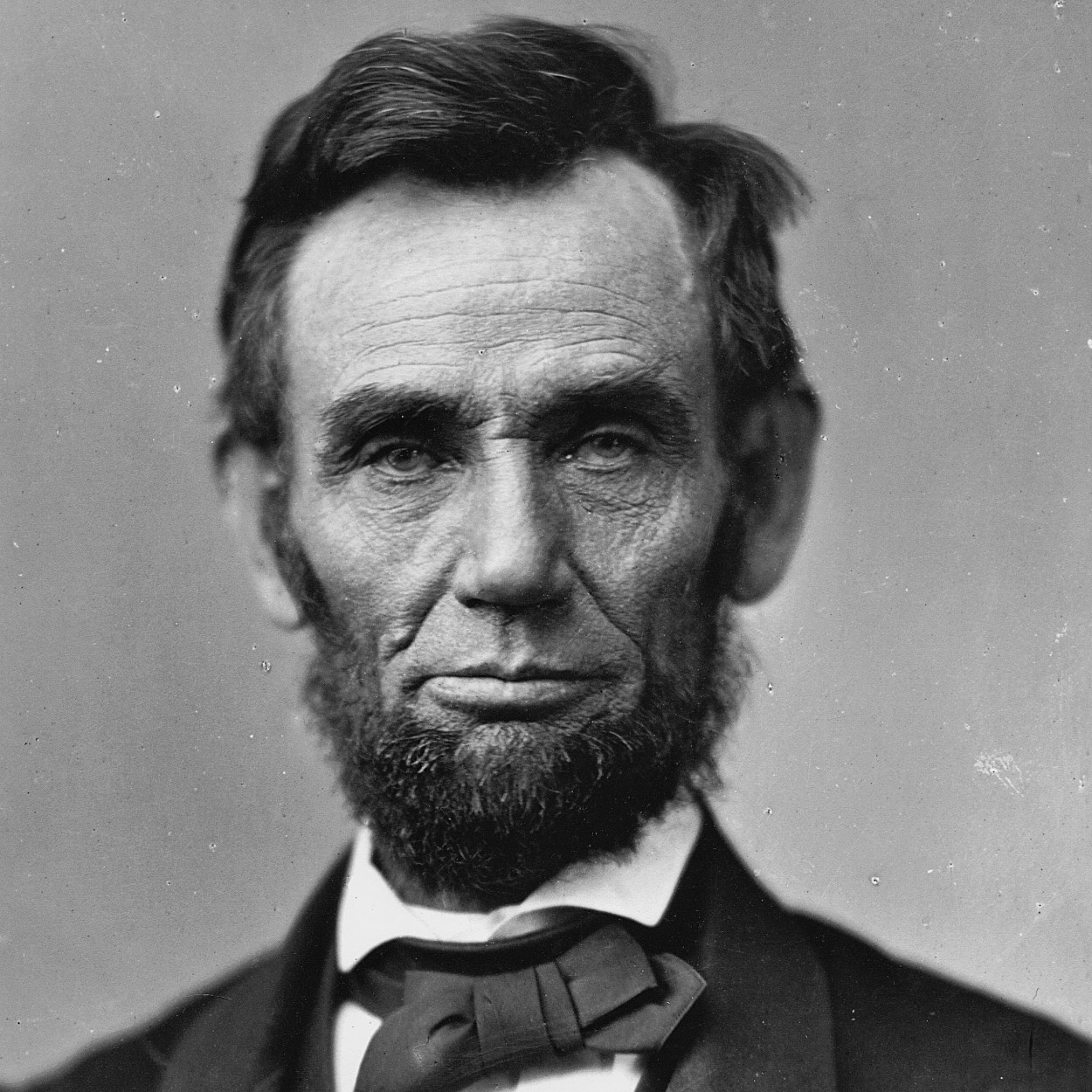
Abraham Lincoln
The 16th President of the United States
The biography for President Lincoln and past presidents is courtesy of the White House Historical Association.
Abraham Lincoln became the United States’ 16th President in 1861, issuing the Emancipation Proclamation that declared forever free those slaves within the Confederacy in 1863.
Lincoln warned the South in his Inaugural Address: “In your hands, my dissatisfied fellow countrymen, and not in mine, is the momentous issue of civil war. The government will not assail you…. You have no oath registered in Heaven to destroy the government, while I shall have the most solemn one to preserve, protect and defend it.”
Lincoln thought secession illegal, and was willing to use force to defend Federal law and the Union. When Confederate batteries fired on Fort Sumter and forced its surrender, he called on the states for 75,000 volunteers. Four more slave states joined the Confederacy but four remained within the Union. The Civil War had begun.
The son of a Kentucky frontiersman, Lincoln had to struggle for a living and for learning. Five months before receiving his party’s nomination for President, he sketched his life:
“I was born Feb. 12, 1809, in Hardin County, Kentucky. My parents were both born in Virginia, of undistinguished families–second families, perhaps I should say. My mother, who died in my tenth year, was of a family of the name of Hanks…. My father … removed from Kentucky to … Indiana, in my eighth year…. It was a wild region, with many bears and other wild animals still in the woods. There I grew up…. Of course when I came of age I did not know much. Still somehow, I could read, write, and cipher … but that was all.”
Lincoln made extraordinary efforts to attain knowledge while working on a farm, splitting rails for fences, and keeping store at New Salem, Illinois. He was a captain in the Black Hawk War, spent eight years in the Illinois legislature, and rode the circuit of courts for many years. His law partner said of him, “His ambition was a little engine that knew no rest.”
He married Mary Todd, and they had four boys, only one of whom lived to maturity. In 1858 Lincoln ran against Stephen A. Douglas for Senator. He lost the election, but in debating with Douglas he gained a national reputation that won him the Republican nomination for President in 1860.
As President, he built the Republican Party into a strong national organization. Further, he rallied most of the northern Democrats to the Union cause. On January 1, 1863, he issued the Emancipation Proclamation that declared forever free those slaves within the Confederacy.
Lincoln never let the world forget that the Civil War involved an even larger issue. This he stated most movingly in dedicating the military cemetery at Gettysburg: “that we here highly resolve that these dead shall not have died in vain–that this nation, under God, shall have a new birth of freedom–and that government of the people, by the people, for the people, shall not perish from the earth.”
Lincoln won re-election in 1864, as Union military triumphs heralded an end to the war. In his planning for peace, the President was flexible and generous, encouraging Southerners to lay down their arms and join speedily in reunion.
The spirit that guided him was clearly that of his Second Inaugural Address, now inscribed on one wall of the Lincoln Memorial in Washington, D. C.: “With malice toward none; with charity for all; with firmness in the right, as God gives us to see the right, let us strive on to finish the work we are in; to bind up the nation’s wounds…. ”
On Good Friday, April 14, 1865, Lincoln was assassinated at Ford’s Theatre in Washington by John Wilkes Booth, an actor, who somehow thought he was helping the South. The opposite was the result, for with Lincoln’s death, the possibility of peace with magnanimity died.
Learn more about Abraham Lincoln’s spouse, Mary Todd Lincoln .
Stay Connected
We'll be in touch with the latest information on how President Biden and his administration are working for the American people, as well as ways you can get involved and help our country build back better.
Opt in to send and receive text messages from President Biden.

- Games & Quizzes
- History & Society
- Science & Tech
- Biographies
- Animals & Nature
- Geography & Travel
- Arts & Culture
- On This Day
- One Good Fact
- New Articles
- Lifestyles & Social Issues
- Philosophy & Religion
- Politics, Law & Government
- World History
- Health & Medicine
- Browse Biographies
- Birds, Reptiles & Other Vertebrates
- Bugs, Mollusks & Other Invertebrates
- Environment
- Fossils & Geologic Time
- Entertainment & Pop Culture
- Sports & Recreation
- Visual Arts
- Demystified
- Image Galleries
- Infographics
- Top Questions
- Britannica Kids
- Saving Earth
- Space Next 50
- Student Center

Abraham Lincoln summary
Explore the life of abraham lincoln as an abolitionist and as the 16th president of the u.s..

Abraham Lincoln , (born Feb. 12, 1809, near Hodgenville, Ky., U.S.—died April 15, 1865, Washington, D.C.), 16th president of the U.S. (1861–65). Born in a Kentucky log cabin, he moved to Indiana in 1816 and to Illinois in 1830. After working as a storekeeper, a rail-splitter, a postmaster, and a surveyor, he enlisted as a volunteer in the Black Hawk War (1832) and was elected captain of his company. He taught himself law and in 1836 passed the bar examination. In 1837 he moved his practice from New Salem to Springfield, Ill. He became a successful circuit-riding lawyer, noted for his shrewdness, common sense, and honesty (earning the nickname “Honest Abe”). From 1834 to 1840 he served in the Illinois state legislature, and in 1847 he was elected as a Whig to the U.S. House of Representatives. In 1856 he joined the Republican Party, which nominated him as its candidate in the 1858 Senate election. In a series of seven debates with Stephen A. Douglas (the Lincoln-Douglas Debates ), he argued against the extension of slavery into the territories. Though morally opposed to slavery, he was not an abolitionist; indeed, he attempted to rebut Douglas’s charge that he was a dangerous radical, by reassuring audiences that he did not favour political equality for blacks. Despite his loss in the election, the debates brought him national attention. In the 1860 presidential election, he ran against Douglas again and won by a large margin in the electoral college, though he received only two-fifths of the popular vote. The South opposed his position on slavery in the territories, and before his inauguration seven Southern states had seceeded from the Union. The ensuing American Civil War completely consumed Lincoln’s administration. He excelled as a wartime leader, creating a high command for directing all the country’s energies and resources toward the war effort and combining statecraft and overall command of the armies with what some have called military genius. However, his abrogation of some civil liberties, especially the writ of habeas corpus , and the closing of several newspapers by his generals disturbed both Democrats and Republicans, including some members of his own cabinet. To unite the North and influence foreign opinion, he issued the Emancipation Proclamation (1863); his Gettysburg Address (1863) further ennobled the war’s purpose. The continuing war affected some Northerners’ resolve and his reelection was not assured, but strategic battle victories turned the tide, and he easily defeated George B. McClellan in 1864. His platform included passage of the 13th Amendment outlawing slavery (ratified 1865). At his second inaugural, with victory in sight, he spoke of moderation in reconstructing the South and building a harmonious Union. On April 14, five days after the war ended, he was shot and mortally wounded by John Wilkes Booth .

Abraham Lincoln
By alvin ward | oct 30, 2019.

U.S. PRESIDENTS (1809–1865); HODGENVILLE, KENTUCKY
Abraham Lincoln is often ranked as one of the United States’s most important presidents for his role in steering the country through the Civil War and his insistence on abolishing slavery, culminating in the Emancipation Proclamation. Read on for some of his most famous quotes and facts about his family life, his iconic look (including that stovepipe hat), and his eventual assassination.
1. Abraham Lincoln and his wife, Mary Todd, lost three of their four children early on.
The Lincolns had four sons:
Eddie died at age 3 of "chronic consumption" (likely tuberculosis), and Willie was born 10 months later. In 1862, while the family was in the White House, 11-year-old Willie died of typhoid fever. Little Tad, who eventually recovered from the typhoid fever he had at the same time as Willie, survived his father but died in 1871 at age 18, possibly from a heart condition. Oldest brother Robert was the only one to survive to adulthood, and, in his father’s footsteps, had a long career in politics, serving as both the Secretary of War and Ambassador to the UK.
2. LINCOLN’S HEIGHT WAS FORMIDABLE, EVEN BEFORE HE PUT ON HIS FAMOUS TOP HAT.

At 6 foot 4 inches, Lincoln remains the tallest president in U.S. history. And one of his iconic top hats—the one he wore (which was 7 to 8 inches tall) to Ford’s Theatre the night of his assassination—is a permanent piece of the Smithsonian collection.
3. Lincoln’s presidency truly marked the beginning of the Civil War.
Lincoln won the presidential election of 1860 without carrying any Southern states, and politicians from the region immediately became more open when discussing rebellion. By the time Lincoln was inaugurated in March 1861, seven states had seceded with more to follow after. The Confederacy ratified their own constitution within the week, and the first battle of the Civil War broke out at Fort Sumter in Charleston, South Carolina, just weeks later.
4. Abraham Lincoln was the first Republican president.

When the Republican Party was formed in 1854, it was in response to the repeal of the Missouri Compromise, which opened the Kansas and Nebraska territories up as possible future slave states. By 1860, the Northern abolitionist-filled party won control of both the House and Senate and the White House. Lincoln issued the Emancipation Proclamation on New Year’s Day 1863, and the Republican Congress pushed the Thirteenth Amendment through in 1865, which effectively banned slavery.
5. Abraham Lincoln was the first president to be assassinated.
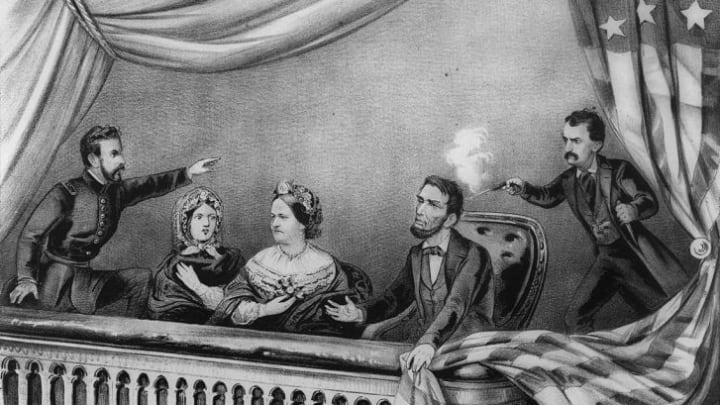
On April 14, 1865, Lincoln was shot by actor John Wilkes Booth while the president was watching a play at Ford’s Theatre. The president would be pronounced dead in the early hours of April 15. Lincoln was 56 years old when he was assassinated, but he wasn’t the only target that night—Booth had conspired with others to simultaneously attack Vice President Andrew Johnson and Secretary of State William Seward . Booth was the only one who succeeded in his mission that night.
6. It took more than 50 years for the Lincoln Memorial to be approved and completed.
It’s now the most visited monument in Washington D.C., but it took decades of squabbling before the Lincoln Memorial was built. Though Congress had formed the National Lincoln Monument Association to begin planning in 1867, construction wouldn’t actually begin until 1914. When the monument finally opened to the public in 1922, Robert Todd Lincoln was in attendance.
7. Lincoln’s Gettysburg Address took about three minutes to deliver.
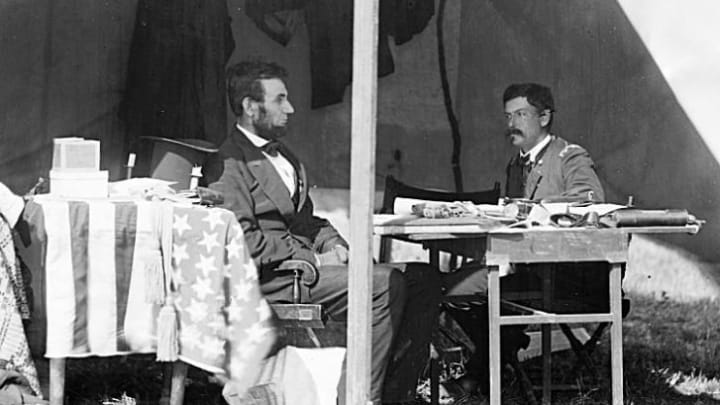
When Abraham Lincoln made his famous Gettysburg Address on November 19, 1863, his words weren’t supposed to live on in history. In fact, the 16th president wasn’t even the primary speaker that day; that honor went to a scholar and statesman named Edward Everett , who was touted as one of the country’s great orators at the time.
At just around 270 words, Lincoln’s speech took about three minutes to make, but it’s lived on ever since as a shining example of impactful brevity. Everett’s speech, on the other hand, came in at 13,000 words and took over two hours to deliver—and chances are, most Americans will never know it happened at all. Fittingly, when addressing the crowd that day, Lincoln said, "the world will little note, nor long remember what we say here."
Turns out he was right—at least about one of the speeches.
Famous Abraham Lincoln Quotes:
- "Nearly all men can stand adversity, but if you want to test a man’s character, give him power."
- "Those who deny freedom to others, deserve it not for themselves."
- "Be sure you put your feet in the right place, then stand firm."
- "I have always found that mercy bears richer fruits than strict justice."
- The Midwest
- Reading Lists

The 15 Best Books on President Abraham Lincoln
Essential books on abraham lincoln.

There are countless books on Abraham Lincoln, and it comes with good reason, aside from being elected America’s sixteenth President (1861-1865), he issued the Emancipation Proclamation that declared forever free those slaves within the Confederacy and preserved the Union while serving as Commander-in-Chief amidst a brutal Civil War.
“Of our political revolution of ’76, we all are justly proud. It has given us a degree of political freedom, far exceeding that of any other nation of the earth,” Lincoln remarked. “In it the world has found a solution of the long mooted problem, as to the capability of man to govern himself. In it was the germ which has vegetated, and still is to grow and expand into the universal liberty of mankind.”
In order to get to the bottom of what inspired one of history’s most consequential figures to the heights of societal contribution, we’ve compiled a list of the 15 best books on Abraham Lincoln.
Lincoln by David Herbert Donald

Donald brilliantly depicts Lincoln’s gradual ascent from humble beginnings in rural Kentucky to the ever-expanding political circles in Illinois, and finally to the presidency of a country divided by civil war. Donald goes beyond biography, illuminating the gradual development of Lincoln’s character, chronicling his tremendous capacity for evolution and growth, thus illustrating what made it possible for a man so inexperienced and so unprepared for the presidency to become a great moral leader. In the most troubled of times, here was a man who led the country out of slavery and preserved a shattered Union – in short, one of the greatest presidents this country has ever seen.
Team of Rivals by Doris Kearns Goodwin

On May 18, 1860, William H. Seward, Salmon P. Chase, Edward Bates, and Abraham Lincoln waited in their hometowns for the results from the Republican National Convention in Chicago. When Lincoln emerged as the victor, his rivals were dismayed and angry.
Throughout the turbulent 1850s, each had energetically sought the presidency as the conflict over slavery was leading inexorably to secession and civil war. That Lincoln succeeded, Goodwin demonstrates, was the result of a character that had been forged by experiences that raised him above his more privileged and accomplished rivals. He won because he possessed an extraordinary ability to put himself in the place of other men, to experience what they were feeling, to understand their motives and desires.
It was this capacity that enabled Lincoln as president to bring his disgruntled opponents together, create the most unusual cabinet in history, and marshal their talents to the task of preserving the Union and winning the war.
We view the long, horrifying struggle from the vantage of the White House as Lincoln copes with incompetent generals, hostile congressmen, and his raucous cabinet. He overcomes these obstacles by winning the respect of his former competitors, and in the case of Seward, finds a loyal and crucial friend to see him through.
This brilliant multiple biography is centered on Lincoln’s mastery of men and how it shaped the most significant presidency in the nation’s history.
Lincoln at Gettysburg by Gary Wills

The power of words has rarely been given a more compelling demonstration than in the Gettysburg Address. Lincoln was asked to memorialize the gruesome battle. Instead he gave the whole nation “a new birth of freedom” in the space of a mere 272 words. His entire life and previous training and his deep political experience went into this, his revolutionary masterpiece.
By examining both the address and Lincoln in their historical moment and cultural frame, Wills breathes new life into words we thought we knew, and reveals much about a president so mythologized but often misunderstood. Wills shows how Lincoln came to change the world and to effect an intellectual revolution, how his words had to and did complete the work of the guns, and how Lincoln wove a spell that has not yet been broken.

Lincoln’s Sword by Douglas L. Wilson

Widely considered in his own time as a genial but provincial lightweight who was out of place in the presidency, Abraham Lincoln astonished his allies and confounded his adversaries by producing a series of speeches and public letters so provocative that they helped revolutionize public opinion on such critical issues as civil liberties, the use of black soldiers, and the emancipation of slaves. This is a brilliant and unprecedented examination of how Lincoln used the power of words to not only build his political career but to keep the country united during the Civil War.
The Fiery Trial by Eric Foner

Selected as a Notable Book of the Year by the New York Times Book Review , this landmark work gives us a definitive account of Lincoln’s lifelong engagement with the nation’s critical issue: American slavery. A master historian, Eric Foner draws Lincoln and the broader history of the period into perfect balance. We see Lincoln, a pragmatic politician grounded in principle, deftly navigating the dynamic politics of antislavery, secession, and civil war. Lincoln’s greatness emerges from his capacity for moral and political growth.
Lincoln on the Verge by Ted Widmer

As a divided nation plunges into the deepest crisis in its history, Abraham Lincoln boards a train for Washington and his inauguration – an inauguration Southerners have vowed to prevent. Lincoln on the Verge charts these pivotal thirteen days of travel, as Lincoln discovers his power, speaks directly to the public, and sees his country up close.
Drawing on new research, this riveting account reveals the president-elect as a work in progress, showing him on the verge of greatness, as he foils an assassination attempt, forges an unbreakable bond with the American people, and overcomes formidable obstacles in order to take his oath of office.
A. Lincoln: A Biography by Ronald C. White

Through meticulous research of the newly completed Lincoln Legal Papers, as well as of recently discovered letters and photographs, White provides a portrait of Lincoln’s personal, political, and moral evolution.
White shows us Lincoln as a man who would leave a trail of thoughts in his wake, jotting ideas on scraps of paper and filing them in his top hat or the bottom drawer of his desk; a country lawyer who asked questions in order to figure out his own thinking on an issue, as much as to argue the case; a hands-on commander in chief who, as soldiers and sailors watched in amazement, commandeered a boat and ordered an attack on Confederate shore batteries at the tip of the Virginia peninsula; a man who struggled with the immorality of slavery and as president acted publicly and privately to outlaw it forever; and finally, a president involved in a religious odyssey who wrote, for his own eyes only, a profound meditation on “the will of God” in the Civil War that would become the basis of his finest address.
Most enlightening, the man who comes into focus in this gem among books on Abraham Lincoln is a person of intellectual curiosity, comfortable with ambiguity, and unafraid to “think anew and act anew.”
Tried by War by James M. McPherson

As we celebrate the bicentennial of Lincoln’s birth, this study by preeminent, bestselling Civil War historian James M. McPherson provides a rare, fresh take on one of the most enigmatic figures in American history. Tried by War offers a revelatory (and timely) portrait of leadership during the greatest crisis our nation has ever endured. Suspenseful and inspiring, this is the story of how Lincoln, with almost no previous military experience before entering the White House, assumed the powers associated with the role of Commander in Chief, and through his strategic insight and will to fight changed the course of the war and saved the Union.
Honor’s Voice by Douglas L. Wilson

Abraham Lincoln’s remarkable emergence from the rural Midwest and his rise to the presidency have been the stuff of romance and legend. But as Douglas L. Wilson shows us in Honor’s Voice, Lincoln’s transformation was not one long triumphal march, but a process that was more than once seriously derailed. There were times, in his journey from storekeeper and mill operator to lawyer and member of the Illinois state legislature, when Lincoln lost his nerve and self-confidence – on at least two occasions he became so despondent as to appear suicidal – and when his acute emotional vulnerabilities were exposed.
Focusing on the crucial years between 1831 and 1842, Wilson’s skillful analysis of the testimonies and writings of Lincoln’s contemporaries reveals the individual behind the legends. We see Lincoln as a boy: not the dutiful son studying by firelight, but the stubborn rebel determined to make something of himself. We see him as a young man: not the ascendant statesman, but the canny local politician who was renowned for his talents in wrestling and storytelling (as well as for his extensive store of off-color jokes).
Wilson also reconstructs Lincoln’s frequently anguished personal life: his religious skepticism, recurrent bouts of depression, and difficult relationships with women – from Ann Rutledge to Mary Owens to Mary Todd.
Abraham Lincoln by Lord Charnwood

No other narrative account of Abraham Lincoln’s life has inspired such widespread and lasting acclaim as Charnwood’s Abraham Lincoln: A Biography . Written by a native of England and originally published in 1916, the biography is a rare blend of beautiful prose and profound historical insight. Charnwood’s study of Lincoln’s statesmanship introduced generations of Americans to the life and politics of Lincoln and the author’s observations are so comprehensive and well-supported that any serious study of Lincoln must respond to his conclusions.
Lincoln’s Melancholy by Joshua Wolf Shenk

Giving shape to the deep depression that pervaded Lincoln’s adult life, Joshua Wolf Shenk’s Lincoln’s Melancholy reveals how this illness influenced both the president’s character and his leadership. Lincoln forged a hard path toward mental health from the time he was a young man. Shenk draws from historical records, interviews with Lincoln scholars, and contemporary research on depression to understand the nature of his unhappiness. In the process, he discovers that the President’s coping strategies; among them, a rich sense of humor and a tendency toward quiet reflection; ultimately helped him to lead the nation through its greatest turmoil.
Lincoln at Cooper Union by Harold Holzer

This favorite among books on Abraham Lincoln explores his most influential and widely reported pre-presidential address – an extraordinary appeal by the western politician to the eastern elite that propelled him toward the Republican nomination for president. Delivered in New York in February 1860, the Cooper Union speech dispelled doubts about Lincoln’s suitability for the presidency and reassured conservatives of his moderation while reaffirming his opposition to slavery to Republican progressives.
Award-winning Lincoln scholar Harold Holzer places Lincoln and his speech in the context of the times – an era of racism, politicized journalism, and public oratory as entertainment – and shows how the candidate framed the speech as an opportunity to continue his famous “debates” with his archrival Democrat Stephen A. Douglas on the question of slavery.
Holzer describes the enormous risk Lincoln took by appearing in New York, where he exposed himself to the country’s most critical audience and took on Republican Senator William Henry Seward of New York, the front runner, in his own backyard. Then he recounts a brilliant and innovative public relations campaign, as Lincoln took the speech “on the road” in his successful quest for the presidency.
Abraham Lincoln: The Prairie Years by Carl Sandberg

Originally published in six volumes, Sandburg’s Abraham Lincoln was called “the greatest historical biography of our generation.” Sandburg distilled this work into one volume that became one of the definitive books on Abraham Lincoln.
We Are Lincoln Men by David Herbert Donald

Though Abraham Lincoln had hundreds of acquaintances and dozens of admirers, he had almost no intimate friends. Behind his mask of affability and endless stream of humorous anecdotes, he maintained an inviolate reserve that only a few were ever able to penetrate.
Professor Donald’s remarkable book offers a fresh way of looking at Abraham Lincoln, both as a man who needed friendship and as a leader who understood the importance of friendship in the management of men. Donald penetrates Lincoln’s mysterious reserve to offer a new picture of the president’s inner life and to explain his unsurpassed political skills.
The Lincolns: Portraits of a Marriage by Daniel Mark

Although the private lives of political couples have in our era become front-page news, the true story of this extraordinary and tragic first family has never been fully told. The Lincolns eclipses earlier accounts with riveting new information that makes husband and wife, president and first lady, come alive in all their proud accomplishments and earthy humanity.
Award-winning biographer and poet Daniel Mark Epstein gives a fresh close-up view of the couple’s life in Springfield, Illinois (of their twenty-two years of marriage, all but six were spent there), and dramatizes with stunning immediacy how the Lincolns’ ascent to the White House brought both dazzling power and the slow, secret unraveling of the couple’s unique bond.
If you enjoyed this guide to essential books on Abraham Lincoln, be sure to check out our list of The 10 Best Books on President George Washington !
Biography Online

Abraham Lincoln Biography | Quotes | Facts
“With malice toward none; with charity for all; with firmness in the right, as God gives us to see the right, let us strive on to finish the work we are in; to bind up the nation’s wounds…. ”
– Abraham Lincoln
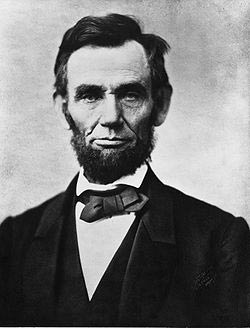
“If I were two-faced, would I be wearing this one?”
Work colleagues and friends noted that Lincoln had a capacity to defuse tense and argumentative situations, though the use of humour and his capacity to take an optimistic view of human nature. He loved to tell stories to illustrate a serious point through the use of humour and parables.
Lincoln was shy around women but after a difficult courtship, he married Mary Todd in 1842. Mary Todd shared many of her husband’s political thinking but they also had different temperaments – with Mary more prone to swings in her emotions. They had four children, who Lincoln was devoted to. Although three died before reaching maturity – which caused much grief to both parents.
As a lawyer, Abraham developed a capacity for quick thinking and oratory. His interest in public issues encouraged him to stand for public office. In 1847, he was elected to the House of Representatives for Illinois and served from 1847-49. During his period in Congress, Lincoln criticised President Folk’s handling of the American-Mexican War, arguing Polk used patriotism and military glory to defend the unjust action of taking Mexican territory. However, Lincoln’s stance was politically unpopular and he was not re-elected.
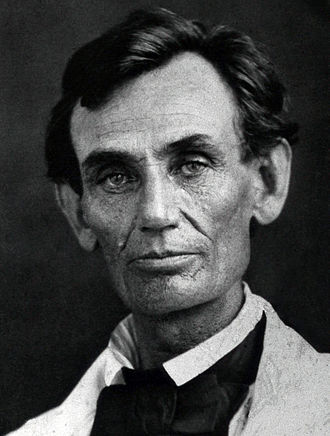
He gave influential speeches, which drew on the Declaration of Independence to prove the Founding Fathers had intended to stop the spread of slavery. In particular, Lincoln used a novel argument that although society was a long way from equality, America should aspire towards the lofty statement in the Declaration of Independence.
“We hold these truths to be self-evident: That all men are created equal”
Lincoln had a strong capacity for empathy. He would try to see problems from everyone’s point of view – including southern slaveholders. He used this concept of empathy to speak against slavery.
“I have always thought that all men should be free; but if any should be slaves, it should be first those who desire it for themselves, and secondly, those who desire it for others. When I hear anyone arguing for slavery, I feel a strong impulse to see it tried on him personally.”
Lincoln’s speeches were notable because they drew on both legal precedents but also easy to understand parables, which struck a chord with the public.
In 1858, Lincoln was nominated as Republican candidate for the Senate. He undertook a series of high-profile debates with the Democratic incumbent Stephen Douglass. Douglass was in favour of allowing the extension of slavery – if citizens voted for it. Lincoln opposed the extension of slavery. During this campaign, he gave one of his best-remembered speeches, which reflected on the divisive nature of America.
“A house divided against itself cannot stand. I believe this government cannot endure, permanently, half slave and half free. I do not expect the Union to be dissolved — I do not expect the house to fall — but I do expect it will cease to be divided. It will become all one thing or all the other. ” ( House Divided )
In this House Divided speech, Lincoln gave a prophetic utterance to the potential for slavery to divide the nation.
Although he lost this 1858 Senate election, his debating skills and oratory caused him to become well known within the Republican party.
On February 27, 1860. Lincoln was also invited to give a notable address at Cooper Union in New York. The East Coast was relatively new territory for Lincoln; many in the audience thought his appearance awkward and even ugly, but his calls for moral clarity over the wrongness of slavery struck a chord with his East coast audience.
“Let us have faith that right makes might, and in that faith, let us, to the end, dare to do our duty as we understand it.” (Cooper Union address)
The reputation he gained on the campaign trail and speeches on the East coast caused him to be put forward as a candidate for the Republican nominee for President in 1860. Lincoln was an outsider because he had much less experience than other leading candidates such as Steward, Bates and Chase, but after finishing second on the first ballot he went on to become unexpectedly nominated.
After a hard-fought, divisive campaign of 1860, Lincoln was elected the first Republican President of the United States. Lincoln’s support came entirely from the North and West of the country. The south strongly disagreed with Lincoln’s position on slavery
The election of Lincoln as President in 1861, sparked the South to secede from the North. Southern independence sentiment had been growing for many years, and the election of a president opposed to slavery was the final straw. However, Lincoln resolutely opposed the breakaway of the South, and this led to the American civil war with Lincoln committed to preserving the Union.
Lincoln surprised many by including in his cabinet the main rivals from the 1860 Republican campaign. It demonstrated Lincoln’s willingness and ability to work with people of different political and personal approaches. This helped to keep the Republican party together.
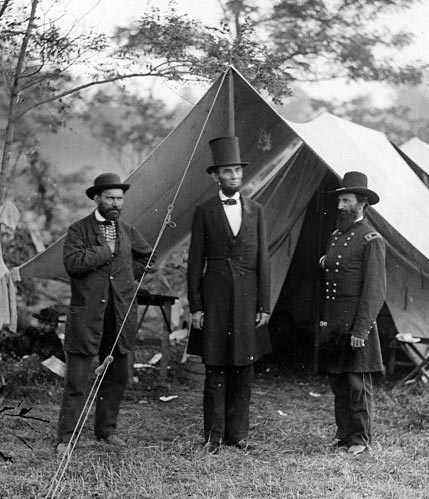
Initially, the war was primarily about the secession of southern states and the survival of the Union, but as the war progressed, Lincoln increasingly made the issue of ending slavery paramount.
On September 22, 1862, Lincoln issued the Emancipation Proclamation that declared the freedom of slaves within the Confederacy.
“… all persons held as slaves within any State or designated part of a State, the people whereof shall then be in rebellion against the United States, shall be then, thenceforward, and forever free” ( Emancipation Proclamation )
The Proclamation came into force on January 1, 1863. Towards the end of the year, many black regiments were raised to help the Union army.
Gettysburg address
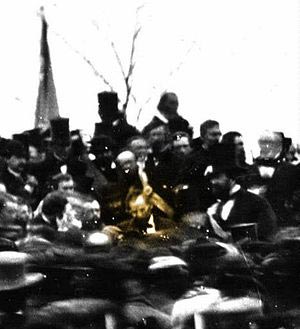
After a difficult opening two years, by 1863, the tide of war started to swing towards the Union forces – helped by the victory at the Battle of Gettysburg in July 1863. Lincoln felt able to redefine the goals of the civil war to include the ending of slavery.
Dedicating the ceremony at Gettysburg on November 19, 1863, Lincoln declared:
“Four score and seven years ago our fathers brought forth on this continent, a new nation, conceived in Liberty, and dedicated to the proposition that all men are created equal. … that we here highly resolve that these dead shall not have died in vain — that this nation, under God, shall have a new birth of freedom — and that government of the people, by the people, for the people, shall not perish from the earth.”
Abraham Lincoln, Gettysburg Address November 19, 1863
Eventually, after four years of attrition, the Federal forces secured the surrender of the defeated south. The union had been saved and the issue of slavery had been brought to a head.
After the Civil War
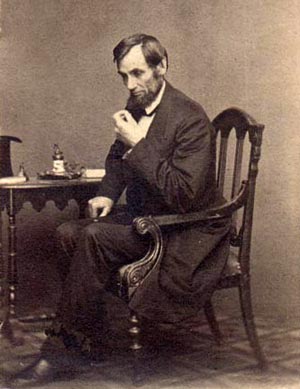
Lincoln 1862
In the aftermath of the civil war, Lincoln sought to reunite the country – offering a generous settlement to the south. When asked how to deal with the southern states, Lincoln replied. “Let ’em up easy.” Lincoln was opposed by more radical factions who wanted greater activism in the south to ensure civil rights for freed slaves.
On January 31, 1865, Lincoln helped pass through Congress a bill to outlaw slavery. The Thirteenth Amendment to the United States Constitution was officially signed into law on December 6, 1865.
Some northern abolitionists and Republicans wanted Lincoln to go further and implement full racial equality on issues of education and voting rights. Lincoln was unwilling to do this (it was a minority political view for the time) Frederick Douglass , a leading black activist (who had escaped from slavery) didn’t always agree with the policies of Lincoln but after meeting Lincoln, he said enthusiastically of the President.
“He treated me as a man; he did not let me feel for a moment that there was any difference in the color of our skins! The President is a most remarkable man. I am satisfied now that he is doing all that circumstances will permit him to do.”
Assassination
Five days after the surrender of Robert E. Lee and the Confederate Army, Lincoln was assassinated by John Wilkes Booth while visiting Ford’s Theatre. Lincoln’s death was widely mourned across the country.
Lincoln is widely regarded as one of America’s most influential and important presidents. As well as saving the Union and promoting Republican values, Lincoln was viewed as embodying the ideals of honesty and integrity.
“Posterity will call you the great emancipator, a more enviable title than any crown could be, and greater than any merely mundane treasure.”
– Giuseppe Garibaldi , 6 August 1863.
“Five score years ago, a great American, in whose symbolic shadow we stand today, signed the Emancipation Proclamation. This momentous decree came as a great beacon light of hope to millions of Negro slaves who had been seared in the flames of withering injustice. It came as a joyous daybreak to end the long night of their captivity.”
Martin Luther King Jr ., “I Have a Dream” speech (28 August 1963), at the Lincoln Memorial
Citation: Pettinger, Tejvan . “Abraham Lincoln Biography ”, Oxford, UK. www.biographyonline.net , 11th Feb 2013. Updated 21st February 2018.
Lincoln – by David Herbert Donald

Lincoln – David Herbert Donald at Amazon
A. Lincoln – a Biography
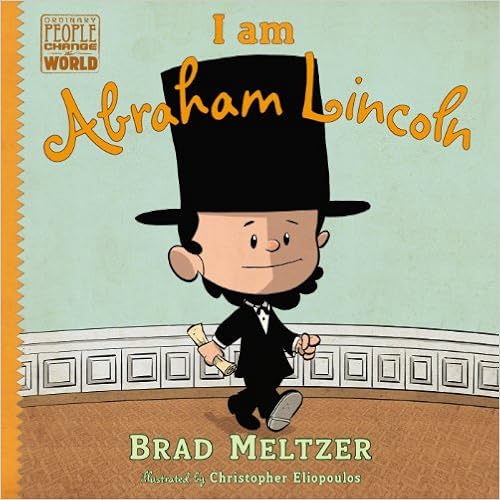
I am Abraham Lincoln by Brad Meltzer at Amazon
Related pages

- People who overcame difficult odds
- Speeches that changed the world
- 100 People who changed the World
External links
- Abraham Lincoln at Congress Guide
- Abraham Lincoln bio
Abraham Lincoln: Facts and Brief Biography
- U.S. Presidents
- Important Historical Figures
- Native American History
- American Revolution
- America Moves Westward
- The Gilded Age
- Crimes & Disasters
- The Most Important Inventions of the Industrial Revolution
- African American History
- African History
- Ancient History and Culture
- Asian History
- European History
- Latin American History
- Medieval & Renaissance History
- Military History
- The 20th Century
- Women's History
:max_bytes(150000):strip_icc():format(webp)/McNamara-headshot-history1800s-5b7422c046e0fb00504dcf97.jpg)
Abraham Lincoln
Life span: Born: February 12, 1809, in a log cabin near Hodgenville, Kentucky. Died: April 15, 1865, in Washington, D.C., the victim of an assassin.
Presidential term: March 4, 1861 - April 15, 1865.
Lincoln was in the second month of his second term when he was assassinated.
Accomplishments: Lincoln was the greatest president of the 19th century, and perhaps of all American history. His greatest accomplishment, of course, was that he held the nation together during the Civil War while also bringing an end to the great divisive issue of the 19th century, slavery in America .
Supported by: Lincoln ran for president as the candidate of the Republican Party in 1860, and was strongly supported by those who opposed the extension of slavery into new states and territories.
The most devoted Lincoln supporters had organized themselves into marching societies, called Wide-Awake Clubs . And Lincoln received support from a broad base of Americans, from factory workers to farmers to New England intellectuals who opposed the institution of slavery.
Opposed by: In the election of 1860 , Lincoln had three opponents, the most prominent of whom was Senator Stephen A. Douglas of Illinois. Lincoln had run for the senate seat held by Douglas two years previously, and that election campaign featured the seven Lincoln-Douglas Debates .
In the election of 1864 Lincoln was opposed by General George McClellan, whom Lincoln had removed from command of the Army of the Potomac in late 1862. McClellan’s platform was essentially a call to bring an end to the Civil War.
Presidential campaigns: Lincoln ran for president in 1860 and 1864, in an era when candidates did not do much campaigning. In 1860 Lincoln only made one appearance at a rally, in his own hometown, Springfield, Illinois.
Personal Life
Spouse and family: Lincoln was married to Mary Todd Lincoln . Their marriage was often rumored to be troubled, and there were many rumors focusing on her alleged mental illness .
The Lincolns had four sons, only one of whom, Robert Todd Lincoln , lived to adulthood. Their son Eddie died in Illinois. Willie Lincoln died in the White House in 1862, after becoming ill, probably from unhealthy drinking water. Tad Lincoln lived in the White House with his parents and returned to Illinois after his father's death. He died in 1871, at the age of 18.
Education: Lincoln only attended school as a child for a few months, and was essentially self-educated. However, he read widely, and many stories about his youth concern him striving to borrow books and reading even while working in the fields.
Early career: Lincoln practiced law in Illinois, and became a well-respected litigator. He handled all sorts of cases, and his legal practice, often with frontier characters for clients, provided many stories he would tell as president.
Later career: Lincoln died while in office. It is a loss to history that he was never able to write a memoir.
Ten Best Abraham Lincoln Biographies

Overwhelmed by the sheer number of Lincoln biographies ? Don’t know where to start ?
Abraham Lincoln books far outnumber those about any other US president. Here are ten of the best Lincoln biographies …
1. Lincoln by David Herbert Donald.
Many critics agree that if you are only going to read one Abraham Lincoln biography this is the one to read…

When and Where was Abraham Lincoln born?
Abraham Lincoln was born on February 12, 1809, in Larue County, Kentucky
How many books about Abraham Lincoln have been published?
Over 16,000 books about Lincoln have been published, as of May 2021, including over 125 books on his assassination. This number is larger than the number of books written about any other person in U.S. history.
To What Political Party did Lincoln belong?
Although Lincoln belonged to the Whig Party early in his career, he ran for President as a Republican, and he is best known for his identification with the Republican Party.
Abraham Lincoln Biographies NEXT BOOK >>>>>>
UPDATED January 2024 – To clean up formatting issues.
| Reading for the Common Good From ERB Editor Christopher Smith -Karen Swallow Prior if (!browserSupportsNewWindows(navigator.userAgent || navigator.vendor || window.opera)) { |
Related Posts:
![Richard Middleton - Abraham's Silence [Feature Review] Richard Middleton - Abraham's Silence [Feature Review]](https://englewoodreview.org/wp-content/uploads/2022/03/Abrahams-Silence-130x130.jpeg)
Comments are closed.
Book Bargains

5 Essential Ebook Deals for Church Leaders – 11 July 2024

Ebook Deal of the Day! Frederick Buechner – Telling Secrets- $1.99

Ebook Deal of the Day! Marilynne Robinson – Gilead – $3.99
Most viewed.
- Rumi Poems – Eight of Our Favorites by the Sufi Mystic 322856 views
- Ten Best Abraham Lincoln Biographies 126912 views
- Walt Whitman Poems – 8 of our Favorites from Leaves of Grass 96273 views
- Hafez Poems – Eight of Our Favorites from the Divan of Hafez ( In English ) 84414 views
- Alexander Pushkin – Eight Favorite Poems by the Russian Poet 84274 views
- Lent – Seven of our Favorite Poems 61413 views
- Against Christian Nationalism: Essential Books [A Reading Guide] 51050 views
- Ten Important Women Theologians To Start Reading 45233 views
- Hilarious One-Star Bible Reviews 42772 views
- Dallas Willard Books – Seven Essential Titles to Read! 41336 views
- Ten Best Alexander Hamilton Biographies 40167 views
- Best Bob Dylan Books – Biographies, Lyrics, and More! 39615 views
- John O’Donohue Poems – Four of our Favorites 38374 views
- Classic Gratitude Poems – Joy Harjo, Mary Oliver, MORE 32782 views
- November – Eight Classic Poems! 31622 views
- Thomas Merton Books – An Intro Reading Guide 29247 views
- Wendell Berry Poems – Seven of Our Favorites! 28165 views
- Antiracism Books for Christians – A Reading Guide 27744 views
- N.T. Wright Books – An Introductory Reading Guide to The Theologian’s Work 27637 views
- St. Augustine – Three Poems 26254 views
- Eastern Orthodoxy – Essential Books [A Reading List] 25174 views
- Joy Harjo Poems – Five of the Best Poems by the Former US Poet Laureate 25169 views
- Twelve Important Theology Books of 2021!!! 23335 views
- Mary Oliver Essays – 10 Prose Selections to Read for Free Online! 23125 views
- Fifteen Important Theology Books of 2022!!! 22173 views
- Emily Dickinson Poems – Seven of our Favorites! 21704 views
- Holy Sonnets – John Donne – Complete Text 21510 views
- Jami – Eight Poems by the Sufi Poet 21358 views
- Fyodor Dostoevsky – Download all his Novels as Free Ebooks !!! 21152 views
- Best Leonard Cohen Books – Biographies and Books by the Songwriter 19320 views
- Gerard Manley Hopkins – 5 Favorite Poems 17765 views
- St. Augustine – Best Books on His Life and Work 17549 views
- Twelve Important Theology Books of 2020!!! 17358 views
- Marilynne Robinson – 10 Freely Available Essays! 17125 views
- Robert Frost – 5 Lesser Known Poems 17066 views
- Twelve Important Fiction Books of 2022! 16960 views
- Henri Nouwen Books – An Introductory Reading Guide 16790 views
- The Best C.S. Lewis Biography (And Other Biographies /Companion Guides)! 16570 views
- Frederick Buechner Books – An Introductory Reading Guide 16422 views
- Spring 2021 Most Anticipated Books for Christian Readers! 16317 views
- Martin Luther King, Jr. – His Prophetic Faith in 15 Quotes 15429 views
- Fifteen Important Theology Books of 2023! 15406 views
- Sabbath Books – Best Reads for Christians on Rest and Sabbath! 15108 views
- Anne Bradstreet Poems – Five of our Favorites by the Puritan Poet! 15059 views
- Spring 2023 – Most Anticipated Books for Christian Readers! 15015 views
- 2023 Advent Calendar of the Year’s Best Books! 14804 views
- Jacques Ellul Books – An Introductory Reading Guide 14661 views
- Best Johnny Cash Books – Biographies and More! 14641 views
- Willa Cather Short Stories – Five Superb Stories to Read for FREE! 14150 views
- Dorothy Sayers Poems – Five of Our Favorites! 14076 views
- Matsuo Basho – Five Haiku – Poetry 13832 views
- John Wesley Sermons – The 7 Best Sermons from the Founder of Methodism! 13609 views
- On Being with Krista Tippett – Top 10 Best Episodes! 13570 views
- Howard Thurman – Books – An Introductory Reading Guide 13338 views
- Spring 2024 – Most Anticipated Books for Christian Readers! 12937 views
Our Favorite Posts:
- > Rumi Poems
- > Hafez Poems
- > Joy Harjo Poems
- > Wendell Berry Poems
- > Dorothy Sayers Poems
The Englewood Review of Books

FREE Ebook! Reading for the Common Good by ERB Editor Chris Smith


The best way to predict the future is to create it.
- By Abraham Lincoln
Abraham Lincoln

Abraham Lincoln, born February 12, 1809, was the 16th President of the United States. Many historians and politicians believe he was the greatest president in terms of leadership, political acumen and character. Lincoln's biography is the stuff of legend. He rose from poverty to become a lawyer, leader and statesman, primarily by virtue of his own determination. During his presidency, Lincoln brought the nation through its greatest challenge, the Civil War, and helped it emerge united if not unscathed. It is impossible to overstate Lincoln's influence on American history from the mid-1800s to the present day.
From Humble Beginnings
Abraham Lincoln was born in LaRue County, Ky., on Sinking Springs Farm. His parents, Thomas and Nancy Hanks Lincoln, had moved into the one-room log cabin just two months before Abraham's birth. He was the couple's second child. They had an older daughter, Sarah. Later a younger son, Thomas, would come along, but the boy would not live beyond infancy.
His father was a farmer and carpenter by trade. When Abe was born, Thomas owned or controlled a number of farms in the area but lost most of the land due to property deed disputes. The family moved to Indiana two years after the boy's birth to start over.
Unlike Kentucky, Indiana did not allow residents to own slaves. It was a "free" territory. In addition, Abe's parents belonged to a strict Separate Baptists church, which prohibited drinking, dancing and slavery. Although the Lincolns chose Hurricane Township, Ind. as their new home because it had more reasonable land ownership statues, the fact that it was a free state likely influenced Abe's future stance on slavery.
Thomas Lincoln was a hard worker who supported his family through farming, cabinet making and other carpentry. He was also a community leader as a land and livestock owner. In Hurricane Township, Thomas managed to recoup his losses in Kentucky and acquired 80 acres of land where he founded the Little Pigeon Creek community.
When Abraham was just nine years old, he lost his mother to milk sickness, which results from drinking milk tainted with white snakeroot. His sister Sarah, 11 years old at the time, had to take over her mother's role in the family and became Abe's chief caretaker.
A year later in 1819, Thomas remarried. His bride was Sally Bush Johnson, a widow with three children. Abe and his stepmother became close over the years, and he called her Mother.
A Love of Learning
Abraham Lincoln preferred reading and writing over farm work, which many around him at the time considered to be laziness. Even so, he educated himself for the most part, with help from time to time from itinerant teachers who passed through town. All in all, Abe had only about 12 months' worth of formal instruction growing up. His early reading material included the Bible, "The Pilgrim's Progress," "Aesop's Fables" and biographies of George Washington and Benjamin Franklin.
As a teenager, Abe earned a reputation for physical strength by besting the leader of the Clary's Grove boys, a group of local bullies. In addition to his farm chores at home, he did odd jobs and gave any earnings to his father to help with family maintenance.
The family moved to Macon County, Ill., in 1830 when Abraham was 21 years of age. He went with them on this move, but as the family prepared to relocate to another part of Illinois the next year, Abe decided it was time he was out on his own.
He lived in the town of New Salem for the next six years. He held various jobs, including boatman, surveyor, soldier, rail splitter and postmaster. He owned and operated a general store. In 1834, Lincoln ran for and was elected as a representative to the Illinois General Assembly. He earned his license to practice law two years later.
Life and Politics
After moving to Springfield, Ill., in 1937, Abe became a junior partner in the law firm of John Todd Stuart. Through Stuart, he met Mary Todd, a visiting cousin from Springfield. She was the daughter of a Kentucky slave owner, Robert Smith Todd.
Abe and Mary began courting three years later, and Abe asked her to marry him in 1840. The wedding took place in Springfield in 1842 when Abe was 33 and Mary just 23 years old.
At first, the newlyweds lived in a second-floor room above a local bar, the Globe Tavern. While there, they welcomed their first child, Robert Todd Lincoln. In 1844, Abe and Mary bought a house near his law office. That same year, Abe established his own law office and took on William Herndon as a junior partner.
The couple's second son, Edward Baker Lincoln, was born in 1846. Soon thereafter, Abe won a seat in the United States Congress as a representative for Illinois. He and his family moved to Washington D.C. in 1847. The following year, Mary took their sons and left Washington, returning to their home in Springfield. She said she believed that their departure would allow Abe to give his full attention to his work, although her husband disagreed. In 1849, Lincoln introduced a bill that would abolish slavery in Washington D.C.
In February the following year, the Lincolns' youngest son, Edward, died of what historians believe was tuberculosis. The boy was not quite four years old. In December, Mary gave birth to another son, William Wallace Lincoln. The couple added yet another son to their family two years later. They named him Thomas and called him Tad.
Abe, whose constituents had been regularly re-electing him to the House, made a bid for the Senate in 1854, but dropped out of the race in favor of the front-runner, Lyman Trumbull. Lincoln did get the nomination for the Senate in 1858, delivering the first of his most well-known speeches at the Illinois Republican Convention with the famous line about the house divided.
His opponent for the Senate seat was Stephen Douglas, and over the next few months, they would engage in the Lincoln-Douglas debates in towns throughout the state. Although Douglas ultimately prevailed in the senate race, Lincoln won a presidential nomination in 1860 at the Republican National Convention in Chicago.
Voters elected Lincoln in November 1860. He chose Maine's Hannibal Hamlin as his vice president.
A Nation Divided
The first state, South Carolina, seceded from the Union late 1860. Three months later, a coalition of southern states established The Confederate States of America with president Jefferson Davis, effectively splitting the nation in two.
In March, Abraham Lincoln officially became the 16th President of the United States at the age of 52. In April, before he and his family had the chance to settle into the White House, Confederate forces attacked Fort Sumter in North Carolina, and the Civil War was underway.
Abe's 11-year-old son, William, died in February 1862. The cause of death was likely typhoid fever.
In September 1862, Lincoln released the first draft of the Emancipation Proclamation , legislation that would free those who were enslaved. It would be effective as of January 1, 1863. Congress subsequently passed the Thirteenth Amendment, also promoted by Lincoln, in 1865, which put an end to legal slavery in the U.S.
Meanwhile, throughout the next couple of years until the spring of 1865, the Civil War raged on. Lincoln delivered several well-known speeches at battle sites, including the Gettysburg Address in November, 1863.
President Lincoln won re-election and delivered his second inaugural speech in March 1865. This time, he tapped Andrew Johnson to be his vice president. A month later, General Robert E. Lee, head of the Confederate forces, conceded defeat, and the war was over.
On April 14, 1865, Confederate spy John Wilkes Booth shot President Abraham Lincoln during a play at the Ford Theater in Washington D.C. The president died the next morning.
The Legacy of Abraham Lincoln
As a self-educated man who rose from humble beginnings to the highest office in the nation, Abraham Lincoln's personal life story is a powerful inspiration to others throughout history. As a politician who led the country through its most trying times since its inception, President Lincoln stands as an icon of resolve, wisdom and compassion. His legacy remains just as influential as it was in the post-Civil War era following his untimely death.
Historians view Lincoln's greatest contributions as president to be preserving the Union throughout the war between the states, his championship of democracy and the abolishment of slavery. Through his courageous leadership in a time of extreme crisis, Abraham Lincoln showed strength and determination. Through his notable addresses to the nation, often on the sites of bloody battles, the president demonstrated his commitment to the Union and compassion for the loss of life. Despite his own losses, including a son who died during his presidency, Lincoln managed to keep the welfare of the nation at the forefront of his political actions.
Lincoln's humanitarian commitment to the emancipation of American slaves earned him the enmity of many and certainly contributed to death. However, it is this commitment, along with his solid leadership through crisis and accomplishments in the face of the nation's strife, that keeps his legacy alive throughout the world and makes him the most admired U.S. president in history.
President Abraham Lincoln
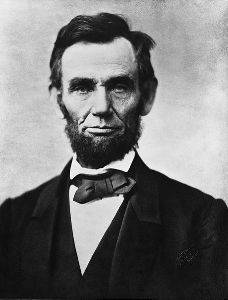
- Honest Abe was the tallest president at 6 feet 4 inches tall.
- He set up a national banking system while he was president. He also established the Department of Agriculture.
- He was known as a gifted storyteller and liked to tell jokes.
- On the day he was shot, Lincoln told his bodyguard that he had dreamt he would be assassinated.
- He was the first president who had a full beard.
- He often stored things like letters and documents in his tall stove-piped hat.
- Listen to a recorded reading of this page:
- Listen to a recorded reading of the Gettysburg Address:
| |
- Biographies & Memoirs
- Leaders & Notable People

Sorry, there was a problem.

Download the free Kindle app and start reading Kindle books instantly on your smartphone, tablet, or computer - no Kindle device required .
Read instantly on your browser with Kindle for Web.
Using your mobile phone camera - scan the code below and download the Kindle app.

Image Unavailable

- To view this video download Flash Player
Follow the author

Abraham Lincoln and Civil War America: A Biography First Edition
- ISBN-10 0195150996
- ISBN-13 978-0195150995
- Edition First Edition
- Publisher Oxford University Press
- Publication date January 1, 2002
- Language English
- Dimensions 5.5 x 1 x 8.5 inches
- Print length 256 pages
- See all details
Editorial Reviews
From publishers weekly.
Copyright 2002 Cahners Business Information, Inc.
From Library Journal
From booklist, book description, about the author, product details.
- Publisher : Oxford University Press; First Edition (January 1, 2002)
- Language : English
- Hardcover : 256 pages
- ISBN-10 : 0195150996
- ISBN-13 : 978-0195150995
- Lexile measure : 1330L
- Item Weight : 15.2 ounces
- Dimensions : 5.5 x 1 x 8.5 inches
- #1,474 in American Civil War Biographies (Books)
- #2,506 in US Presidents
- #4,665 in History & Theory of Politics
About the author
William e. gienapp.
Discover more of the author’s books, see similar authors, read author blogs and more
Customer reviews
Customer Reviews, including Product Star Ratings help customers to learn more about the product and decide whether it is the right product for them.
To calculate the overall star rating and percentage breakdown by star, we don’t use a simple average. Instead, our system considers things like how recent a review is and if the reviewer bought the item on Amazon. It also analyzed reviews to verify trustworthiness.
Customers say
Customers find the book an excellent, easy to follow and understand read. They also say the content is insightful, thorough, and a well-written historical account.
AI-generated from the text of customer reviews
Customers find the book easy to read, full of interesting, pithy quotes from Lincolin and his friends. They also say it provides an excellent overview and superb analysis of the life of Gienapp. Readers also mention that the book is insightful, thorough, and a great read.
"For a short biography, Gienapp's work is insightful , thorough, and a great read...." Read more
"...The author's writing style is superb ...." Read more
"...It counts only 250 pages, but it gives an excellent overwiew and superb analyse of the life of AL. The bibliography is also very interesting...." Read more
" Easy to read , full of interesting, pithy quotes from Lincolin and his contempories. True insight into the era and the politics involved" Read more
Customers find the book well written, interesting, and a fast-reading biography of Abraham Lincoln.
" Very interesting book about Abraham Lincoln and the Civil War...." Read more
" Excellent recap of Lincoln and the Civil War!..." Read more
"A short, but very well biography of Lincoln . It counts only 250 pages, but it gives an excellent overwiew and superb analyse of the life of AL...." Read more
"... True insight into the era and the politics involved" Read more
- Sort reviews by Top reviews Most recent Top reviews
Top reviews from the United States
There was a problem filtering reviews right now. please try again later..
Top reviews from other countries
- About Amazon
- Investor Relations
- Amazon Devices
- Amazon Science
- Sell products on Amazon
- Sell on Amazon Business
- Sell apps on Amazon
- Become an Affiliate
- Advertise Your Products
- Self-Publish with Us
- Host an Amazon Hub
- › See More Make Money with Us
- Amazon Business Card
- Shop with Points
- Reload Your Balance
- Amazon Currency Converter
- Amazon and COVID-19
- Your Account
- Your Orders
- Shipping Rates & Policies
- Returns & Replacements
- Manage Your Content and Devices
- Conditions of Use
- Privacy Notice
- Consumer Health Data Privacy Disclosure
- Your Ads Privacy Choices
We’re fighting to restore access to 500,000+ books in court this week. Join us!
Internet Archive Audio

- This Just In
- Grateful Dead
- Old Time Radio
- 78 RPMs and Cylinder Recordings
- Audio Books & Poetry
- Computers, Technology and Science
- Music, Arts & Culture
- News & Public Affairs
- Spirituality & Religion
- Radio News Archive

- Flickr Commons
- Occupy Wall Street Flickr
- NASA Images
- Solar System Collection
- Ames Research Center

- All Software
- Old School Emulation
- MS-DOS Games
- Historical Software
- Classic PC Games
- Software Library
- Kodi Archive and Support File
- Vintage Software
- CD-ROM Software
- CD-ROM Software Library
- Software Sites
- Tucows Software Library
- Shareware CD-ROMs
- Software Capsules Compilation
- CD-ROM Images
- ZX Spectrum
- DOOM Level CD

- Smithsonian Libraries
- FEDLINK (US)
- Lincoln Collection
- American Libraries
- Canadian Libraries
- Universal Library
- Project Gutenberg
- Children's Library
- Biodiversity Heritage Library
- Books by Language
- Additional Collections

- Prelinger Archives
- Democracy Now!
- Occupy Wall Street
- TV NSA Clip Library
- Animation & Cartoons
- Arts & Music
- Computers & Technology
- Cultural & Academic Films
- Ephemeral Films
- Sports Videos
- Videogame Videos
- Youth Media
Search the history of over 866 billion web pages on the Internet.
Mobile Apps
- Wayback Machine (iOS)
- Wayback Machine (Android)
Browser Extensions
Archive-it subscription.
- Explore the Collections
- Build Collections
Save Page Now
Capture a web page as it appears now for use as a trusted citation in the future.
Please enter a valid web address
- Donate Donate icon An illustration of a heart shape
Abraham Lincoln and Civil War America : a biography
Bookreader item preview, share or embed this item, flag this item for.
- Graphic Violence
- Explicit Sexual Content
- Hate Speech
- Misinformation/Disinformation
- Marketing/Phishing/Advertising
- Misleading/Inaccurate/Missing Metadata
Obscured text on back cover due to sticker attached.
![[WorldCat (this item)] [WorldCat (this item)]](https://archive.org/images/worldcat-small.png)
plus-circle Add Review comment Reviews
283 Previews
10 Favorites
Better World Books
DOWNLOAD OPTIONS
No suitable files to display here.
PDF access not available for this item.
IN COLLECTIONS
Uploaded by station17.cebu on October 18, 2021
SIMILAR ITEMS (based on metadata)
Find anything you save across the site in your account
A New Documentary Will Explore Abraham Lincoln's Romantic Relationships With Men

It turns out Honest Abe may have had a little secret.
A new documentary is exploring the long-held belief that former president Abraham Lincoln was gay. The trailer for the film, Lover of Men: The Untold History of Abraham Lincoln , was released on Wednesday.
The film examines the president’s private life, as well as his life prior to being elected president in 1860, according to People . The film features interviews with several historians, including Hugh Ryan, the author of When Brooklyn Was Queer , who appears in the film’s trailer.
" Lover Of Men examines the intimate life of America’s most consequential president, Abraham Lincoln," the film’s official synopsis reads. "As told by preeminent Lincoln scholars and never before seen photographs and letters, the film details Lincoln’s romantic relationships with men."
The synopsis says that Lover of Men “challenges the audience to consider why we hold such a limited view of human sexuality,” and “serves as an examination of American intolerance.”
Lincoln’s sexuality has long been a subject of speculation; it even has its own Wikipedia page . Magazines have dedicated long-form features to the subject, and a 2005 book took a deep dive into his liaisons. The 16th president’s queerness has also been the foundation of several fictional portrayals of him, including the novel Courting Mr. Lincoln , as well as the current Broadway smash hit Oh, Mary! Written by comedian Cole Escola , the show imagines Lincoln as a closeted gay man and his wife, Mary Todd, as a cabaret star yearning to regain the spotlight.
Weren’t the clues there all along? Wasn’t his stovepipe hat a phallic symbol? He died in a theater … so did I watching Cats the Jellicle Ball for the first time. Isn’t his marriage to Mary Todd just the human embodiment of this tweet:
This content can also be viewed on the site it originates from.
Lover of Men: The Untold History of Abraham Lincoln comes out September 6 in AMC Theaters.
Get the best of what’s queer. Sign up for Them ’s weekly newsletter here.

Fort Abraham Lincoln State Park

Services Offered
Verified by Business
Location & Hours
Suggest an edit
4480 Ft Lincoln Rd
Mandan, ND 58554
Amenities and More
Recommended reviews.
Theater | Review: “Oh, Mary!” on Broadway is about an…
Share this:.
- Click to share on Facebook (Opens in new window)
- Click to share on X (Opens in new window)
- Click to print (Opens in new window)
- Click to email a link to a friend (Opens in new window)
- Music and Concerts
- The Theater Loop
- TV and Streaming
Things To Do
Theater | review: “oh, mary” on broadway is about an unhinged, hilarious mary todd lincoln.

Indeed, the massed forces of the Confederacy are no match for Cole Escola’s chaotic version of Mary Todd Lincoln, a wild-eyed wannabe cabaret star marinated in whisky, paint thinner and self-delusion and the star of an uproariously anachronistic summer farce that has arrived on the Main Stem from edgier points downtown.
Sure, a top ticket price of $300 is pushing it — heavens to Mary, these crazy Broadway prices! — for a show with an 80-minute runtime, an intentionally cheesy set and a cast of five. At times, it feels like you are watching an extended “Saturday Night Live” sketch making campy hay by deconstructing early U.S. history and imagining the battles of a closeted gay Abe (not so much of a stretch) and his unhinged spouse (no stretch at all).
But if you spend your entertainment dollar purely on the basis of laughs per minute, this show’s a bargain, given how many howlers roll out from the stage. The laughs are like Union soldiers crossing a hill in Gettysburg. Abe and Mary are part Rhett Butler and Scarlett O’Hara, part George and Martha, part the old vaudevillians George Burns and Gracie Allen, all running together pell-mell toward the Copacabana.
“I hate those horses,” says Mary. “They laugh at me.”
“We’ve been over this,” says Conrad Ricamora’s long-suffering Abe, technically billed here only as Mary’s Husband. “They’re neighing. Horses neigh.”
“You always take their side,” says Mary, pouting.
Maybe you had to be there, but gadzooks that was funny. Point of fact, pretty much everything in this show is hilarious.
Firstly, Escola’s writing is so old-school whip-smart as to recall those Golden Age TV comedies a la “Laughter on the 23rd Floor.” You’ve heard of Peak TV. Broadway is now seeing a new golden age of the comedic writer-performer, masters of the funny monologue (with room for sidekicks). These shows star their writers’ own sweet selves and require neither overtime nor a $20 million budget, bar bill aside. They’re as hot as Mary’s mysterious acting teacher (hmm, James Scully), or Abe’s young lover, Simon (Tony Macht), whose ministrations extract a steep price from the bearded sensualist.
Second, the director Sam Pinkleton moves the show at such a lightening pace that we’re all on to the next laugh before you start to wonder about the merits of the one before or even dare to question the whole tawdry enterprise. Blackouts come so hard upon the lines of dialogue that the actors have to rush to get their gags out, which makes them all the funnier because it both raises the stakes and keys into one of the key ingredients of great farce: the mutual experience of the chaotic.
Third, Escola understands that comedic characters like the Wednesday Addams-like chaos agent they’ve forged here must be empathetic. From all I’ve written above, it no doubt sounds like the show mocks Mary Todd Lincoln, and so it does, notwithstanding a biography filled with what we would now call mental health issues. But “Oh, Mary!” also takes a cue from “Six” and empowers her by actualizing her imagined desires and mocking the men and women (Bianca Leigh is the remaining cast member) who hold her back.
The idea, clearly, is that you leave with the sense she just was born at the wrong moment. A few decades later, she could have been Patti LuPone.
Between the clever plot points (which I won’t ruin here in any detail), I started musing on what Mary Todd Lincoln would actually have thought of this posthumous treatment. On thing is for sure. We can guess almost nothing about the trajectory of the world after our deaths.
I’ll say this, though, Escola has arrived at exactly the right moment.
They have the perfect director, the right supporting cast (Ricamora is both funny in his own right and fully cognizant of whose name is on the marquee) and, crucially, enough crazy political chaos going on outside the theater’s doors that the wackier this show gets, it never feels too much removed from reality.
At the Lyceum Theatre, 149 W. 45th St., New York; www.ohmaryplay.com
Chris Jones is a Tribune critic.
More in Theater

Theater | Review: ‘Savor,’ now in Chicago, is a bit of dance dazzle in the style of ‘Dancing with the Stars’

Theater | Goodman Theatre announces new Scrooge, cast names for ‘Inherit the Wind’

Theater | ‘Ali’ will premiere in Chicago, a Broadway-bound musical about Muhammad Ali

Theater | Review: In ‘Romeo and Juliet’ by Oak Park Festival Theatre, young love gets a little extra open-air magic
Trending nationally.
- Forget upgrading the family car. These Chicago parents bought cargo bikes instead.
- Podcast: Listen to ‘Felonious Florida: In the Darkness’ now for free
- Pictures: Royal Caribbean’s Utopia of the Seas arrives at Port Canaveral
- Comic-Con agrees to stay in San Diego through 2026, but warns high hotel rates threaten future years
- These are the most iconic venues in Paris for the 2024 Olympics
Top of page

James McBride Awarded the 2024 Prize for American Fiction
July 11, 2024
Posted by: Wendi Maloney
Share this post:
Librarian of Congress Carla Hayden announced this week that the Library is conferring the 2024 Prize for American Fiction on acclaimed author James McBride. He will accept the prize at the National Book Festival on Aug. 24.
One of the Library’s most prestigious awards, the annual Prize for American Fiction honors a literary writer whose body of work is distinguished not only for its mastery of the art, but also for its originality of thought and imagination.
“I’m honored to bestow the Library of Congress Prize for American Fiction on a writer as imaginative and knowing as James McBride,” Hayden said. “McBride knows the American soul deeply, reflecting our struggles and triumphs in his fiction, which so many readers have intimately connected with. I, also, am one of his enthusiastic readers.”
The award seeks to commend strong, unique, enduring voices that — throughout consistently accomplished careers — have told us something essential about the American experience.
“I wish my mom were still alive to know about this,” McBride said. “I’m delighted and honored. Does it mean I can use the Library? If so, I’m double thrilled.”
McBride is the author of the bestselling novel “Deacon King Kong”; “The Good Lord Bird,” winner of the 2013 National Book Award for Fiction; “The Color of Water”; “Song Yet Sung”; the story collection “Five-Carat Soul”; and the James Brown biography “Kill ’Em and Leave.”
His debut novel, “Miracle at St. Anna,” was turned into a 2008 film. In 2016, McBride was awarded the National Humanities Medal.
He is also a musician, a composer and a current distinguished writer-in-residence at New York University.
McBride’s most recent bestselling novel, “The Heaven and Earth Grocery Store,” received the 2023 Kirkus Prize for Fiction and was named Barnes and Noble’s 2023 Book of the Year.
The National Book Festival will take place from 9 a.m. to 8 p.m. at the Walter E. Washington Convention Center in Washington, D.C. The theme is “Books Build Us Up.”
On Aug. 1, McBride will participate in a virtual interview with PBS Books as part of a series previewing 2024 festival authors.
McBride has appeared at multiple National Book Festivals in past years, most recently in 2020, when he spoke about his novel “Deacon King Kong.”
Subscribe to the blog— it’s free!
See All Comments
Add a Comment Cancel reply
Your email address will not be published. Required fields are marked *

COMMENTS
Abraham Lincoln (born February 12, 1809, near Hodgenville, Kentucky, U.S.—died April 15, 1865, Washington, D.C.) was the 16th president of the United States (1861-65), who preserved the Union during the American Civil War and brought about the emancipation of enslaved people in the United States. Lincoln and his cabinet.
Abraham Lincoln was the 16 th president of the United States, serving from 1861 to 1865, and is regarded as one of America's greatest heroes due to his roles in guiding the Union through the ...
Abraham Lincoln (/ ˈ l ɪ ŋ k ən / LING-kən; February 12, 1809 - April 15, 1865) was an American lawyer, politician, and statesman who served as the 16th president of the United States from 1861 until his assassination in 1865. Lincoln led the United States through the American Civil War, defending the nation as a constitutional union, defeating the insurgent Confederacy, playing a major ...
Abraham Lincoln. Lincoln was born on February 12, 1809, to Nancy and Thomas Lincoln in a one-room log cabin in Hardin County, Kentucky. His family moved to southern Indiana in 1816. Lincoln's ...
War & Affiliation Civil War / Union. Date of Birth - Death February 12, 1809 - April 15, 1865. Abraham Lincoln, sixteenth President of the United States, was born near Hodgenville, Kentucky on February 12, 1809. His family moved to Indiana when he was seven and he grew up on the edge of the frontier. He had very little formal education, but ...
Biography Abraham Lincoln's Youth. Abraham Lincoln was born on Sinking Springs Farm near Hodgenville, Kentucky, on February 12, 1809, to Thomas and Nancy Hanks Lincoln. He was named for his paternal grandfather. His birthplace is believed to have been a 16-foot by 18-foot log cabin, which no longer exists. Lincoln had a sister, Sarah, who was ...
Abraham Lincoln Biography. Abraham Lincoln was the 16th President of the United States, serving from 1861 until his assassination in 1865. He is widely considered one of the greatest American presidents and is revered for his leadership during the Civil War and his efforts to abolish slavery. Lincoln was a member of the Republican Party and was ...
The biography for President Lincoln and past presidents is courtesy of the White House Historical Association. Abraham Lincoln became the United States' 16th President in 1861, issuing the ...
Abraham Lincoln, (born Feb. 12, 1809, near Hodgenville, Ky., U.S.—died April 15, 1865, Washington, D.C.), 16th president of the U.S. (1861-65).Born in a Kentucky log cabin, he moved to Indiana in 1816 and to Illinois in 1830. After working as a storekeeper, a rail-splitter, a postmaster, and a surveyor, he enlisted as a volunteer in the Black Hawk War (1832) and was elected captain of his ...
His presidency was dominated by the American Civil War. Abraham Lincoln was born on 12 February 1809 near Hodgenville, Kentucky. He was brought up in Kentucky, Indiana and Illinois. His parents ...
Updated on June 04, 2019. Abraham Lincoln (February 12, 1809-April 15, 1865) was the 16th president of the United States, serving from 1861 to 1865. During his time in office, the nation fought the Civil War, which claimed hundreds of thousands of lives. One of Lincoln's greatest accomplishments was the abolition of enslavement in 1864.
1. Abraham Lincoln and his wife, Mary Todd, lost three of their four children early on. The Lincolns had four sons: Eddie died at age 3 of "chronic consumption" (likely tuberculosis), and Willie ...
Abraham Lincoln by Lord Charnwood. No other narrative account of Abraham Lincoln's life has inspired such widespread and lasting acclaim as Charnwood's Abraham Lincoln: A Biography. Written by a native of England and originally published in 1916, the biography is a rare blend of beautiful prose and profound historical insight.
Abraham Lincoln Biography | Quotes | Facts "With malice toward none; with charity for all; with firmness in the right, as God gives us to see the right, let us strive on to finish the work we are in; to bind up the nation's wounds…. " - Abraham Lincoln. Abraham Lincoln was born Feb 12, 1809, in a single-room log cabin, Hardin County ...
Abraham Lincoln was born on February 12, 1809, in a one-room log cabin on the Sinking Spring farm, south of Hodgenville in Hardin County, Kentucky.His siblings were Sarah Lincoln Grigsby and Thomas Lincoln, Jr. After a land title dispute forced the family to leave in 1811, they relocated to Knob Creek farm, eight miles to the north.By 1814, Thomas Lincoln, Abraham's father, had lost most of ...
Abraham Lincoln in February 1865. Alexander Gardner/Library of Congress. Life span: Born: February 12, 1809, in a log cabin near Hodgenville, Kentucky. Died: April 15, 1865, in Washington, D.C., the victim of an assassin. Presidential term: March 4, 1861 - April 15, 1865. Lincoln was in the second month of his second term when he was ...
Long considered a classic, Benjamin P. Thomas's Abraham Lincoln: A Biography takes an incisive look at one of American history's greatest figures. Originally published in 1952 to wide acclaim, this eloquent account rises above previously romanticized depictions of the sixteenth president to reveal the real Lincoln: a complex, shrewd, and dynamic individual whose exceptional life has long ...
Abraham Lincoln books far outnumber those about any other US president. Here are ten of the best Lincoln biographies …. 1. Lincoln. by David Herbert Donald. Many critics agree that if you are only going to read one Abraham Lincoln biography this is the one to read….
Abraham Lincoln, born February 12, 1809, was the 16th President of the United States. Many historians and politicians believe he was the greatest president in terms of leadership, political acumen and character. Lincoln's biography is the stuff of legend. He rose from poverty to become a lawyer, leader and statesman, primarily by virtue of his ...
by Alexander Gardner. Abraham Lincoln was the 16th President of the United States. Served as President: 1861-1865. Vice President: Hannibal Hamlin, Andrew Johnson. Party: Republican. Age at inauguration: 52. Born: February 12, 1809, in Hodgenville, Hardin County, Kentucky. Died: April 15, 1865. Lincoln died the morning after being shot at Ford ...
Abraham Lincoln: A History is an 1890 ten-volume account of the life and times of Abraham Lincoln, written by John Nicolay and John Hay, ... Ward Hill Lamon in 1872 published a biography of Lincoln based on research by William Herndon, Lincoln's law partner.
In Abraham Lincoln and Civil War America, historian William Gienapp provides a remarkably concise, up-to-date, and vibrant biography of the most revered figure in United States history. While the heart of the book focuses on the Civil War, Gienapp begins with a finely etched portrait of Lincoln's early life, from pioneer farm boy, to politician and lawyer in Springfield, to his stunning ...
Lincoln, Abraham, 1809-1865, Lincoln, Abraham, 1809-1865 -- Military leadership, Presidents -- United States -- Biography, United States -- Politics and government -- 1861-1865 Publisher New York : Oxford University Press Collection internetarchivebooks; printdisabled; inlibrary Contributor Internet Archive Language English
The synopsis says that Lover of Men "challenges the audience to consider why we hold such a limited view of human sexuality," and "serves as an examination of American intolerance.". Lincoln's sexuality has long been a subject of speculation; it even has its own Wikipedia page.Magazines have dedicated long-form features to the subject, and a 2005 book took a deep dive into his liaisons.
4 reviews and 56 photos of FORT ABRAHAM LINCOLN STATE PARK "History buff checking in here. I LOVED IT. vehicles are $5/day (or you can take the trolley from Mandan) and our camping was $12/site/night for up to 6 people. The tours were $6/adult and you get TWO tours! One of the Mandan Village with access to a "home" that has some really cool artifacts that you don't get to see without the pass.
He was the last Commanding Officer of USS MOBILE BAY (CG 53) from May 2022 until decommissioning in August 2023. With USS MOBILE BAY (CG 53), he completed RIMPAC 2022 and deployment as the Air Defense Commander for the ABRAHAM LINCOLN Carrier Strike Group. Most recently he was the Commanding Officer of USS LAKE ERIE (CG 70).
NEW YORK — "This isn't the South we're battling," says an exasperated Abraham Lincoln to one of his soldiers, "it's my wife." Indeed, the massed forces of the Confederacy are no ...
The Library will award the 2024 Prize for American Fiction to novelist and author James McBride, Librarian Carla Hayden announced today. McBride, 66, is the author of the hugely popular memoir "The Color of Water," novels such as "The Good Lord Bird" (winner of the 2013 National Book Award for Fiction) and, most recently "The Heaven and Earth Grocery Store," which received the 2023 Kirkus ...